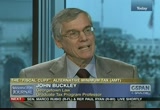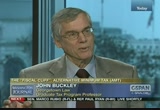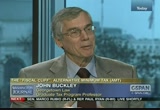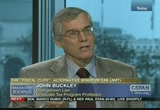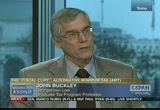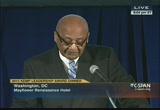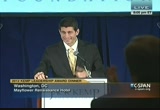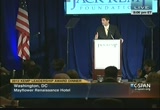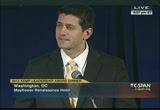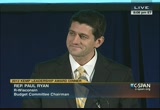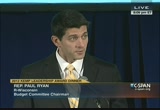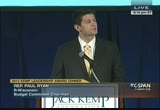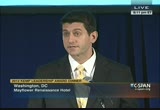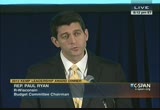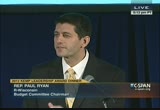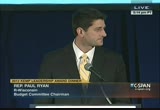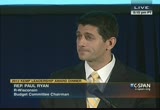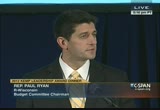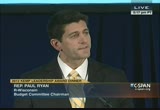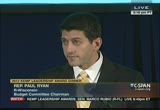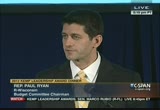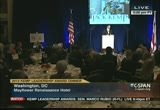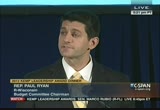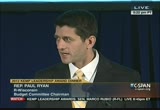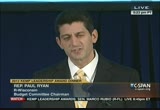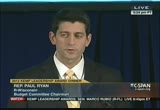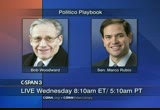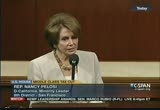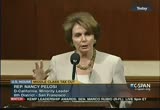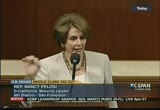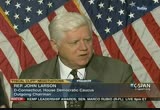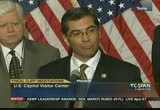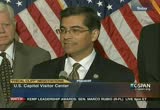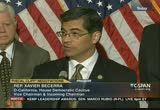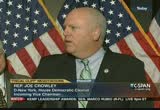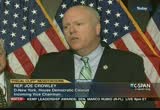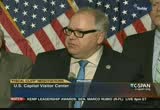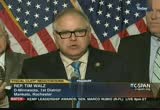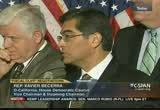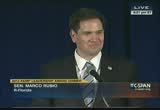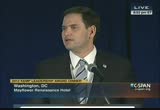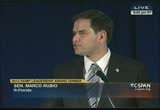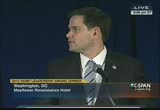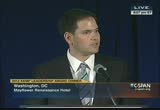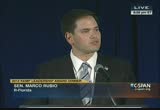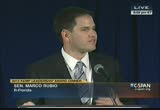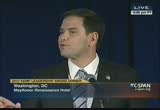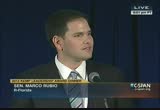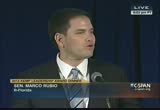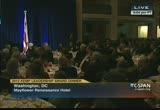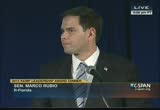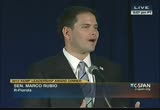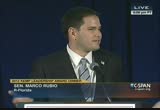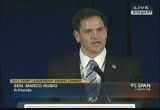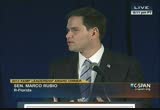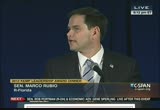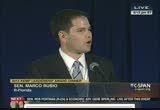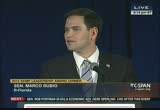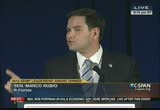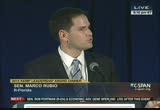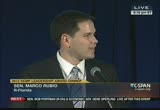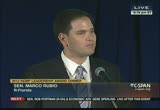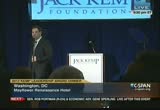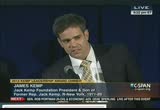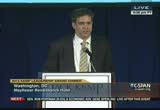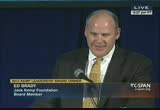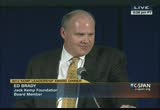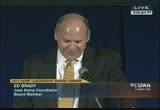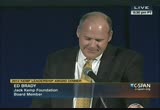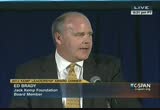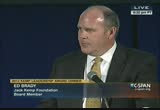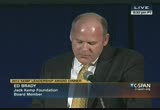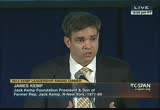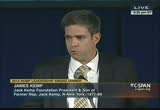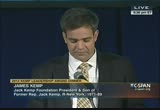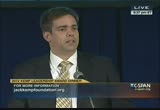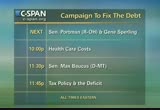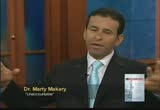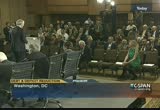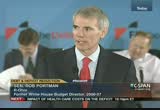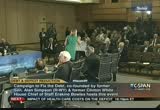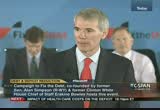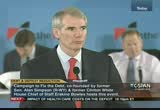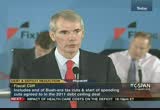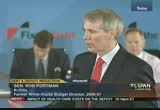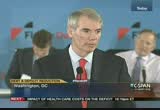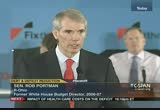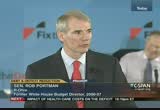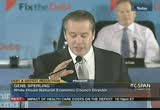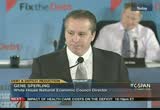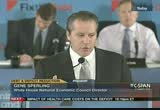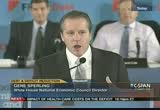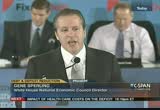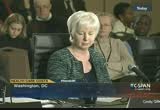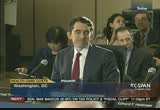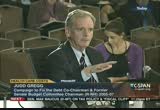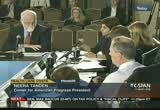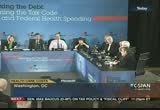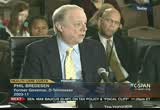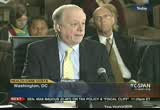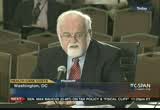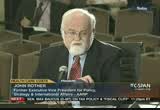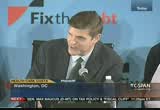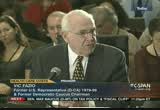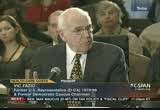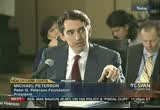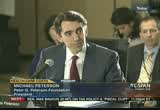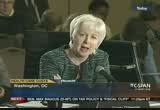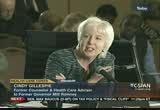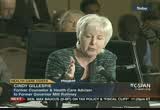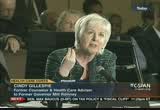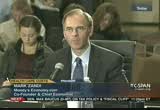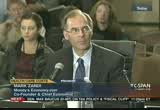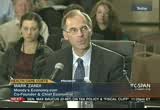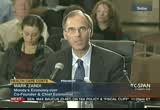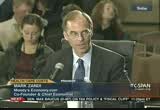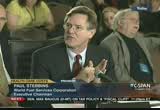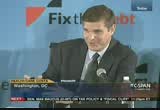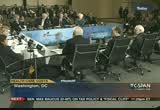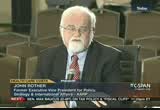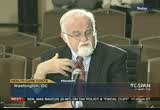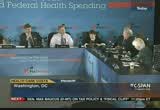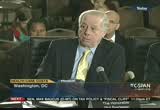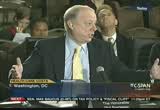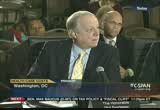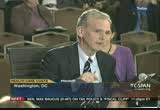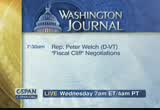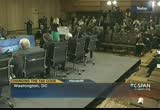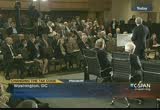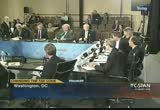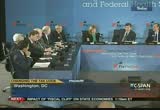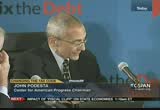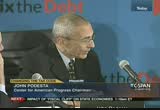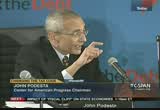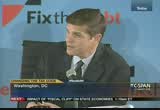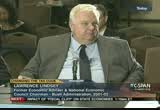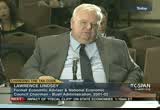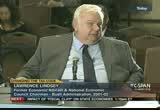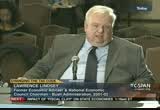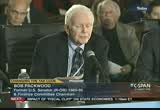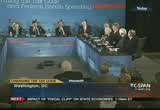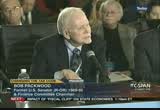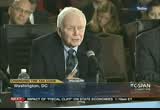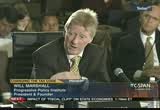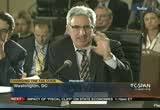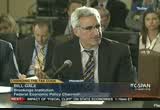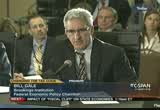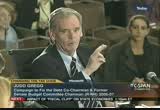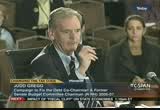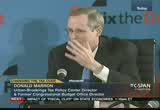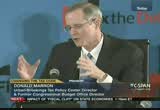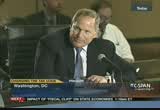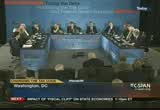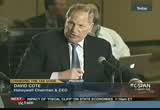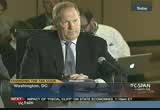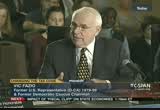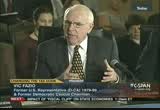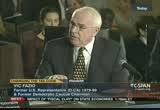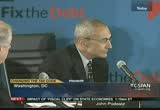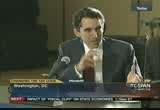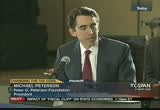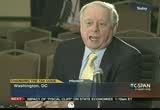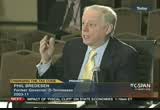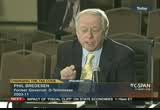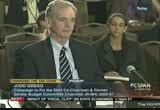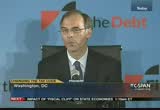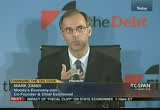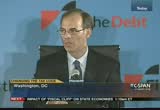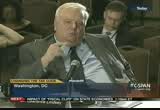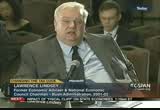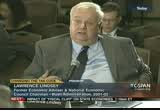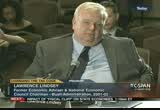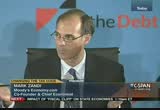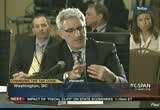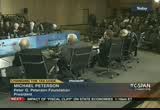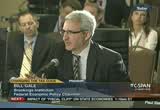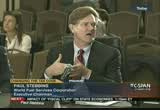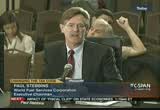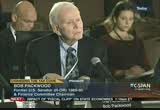tv Capitol Hill Hearings CSPAN December 4, 2012 8:00pm-1:00am EST
8:00 pm
capital gains rate in the a.m.t. is higher than the regular tax rates from incomes around $200,000 to $500,000. and that was the first broad expansion of the a.m.t., it began to hit an awful lot of people. then in 2001 they reduced regular tax rates but did not reduce a.m.t. tax rates. . for many people, the a.m.t. tax bill only changed the name of the tax i paid. i got little benefit from the rate ofin my opinion, the expand on tax has nothing to do with the action of indexing. it is the result of the conscious decision to hike the
8:01 pm
cost of tax reductions. >> the alternative minimum tax is 28%. if your tax rate was lowered to 25%. you still have to pay 28%. >> that is correct. for incomes between to london thousand dollars and $500,000, the effective tax rate is 35%. you hit the 35% rate and incomes fire lower than the income levels at which you would hit the 35% rate and regular tax. >> why do they call it a patch? >> it is a one time year by year patch to stop the broad
8:02 pm
expansion. you could ask why they call it a cliff. they have discussed this in terms of the patch. it is a year by year increase in the exemptions. the patches nothing but the increase in the a in the exemption to prevent tens of millions of people from being forced to fill up the return you have. the only thing i would add is the package, what makes this so critical in the fiscal cliff discussion, is we are talking about the past for the 2012 taxable year.
8:04 pm
unlike the rest of the fiscal cliff which effects rates that will apply next year. the patch applies for returns we file early next year. if there is no congressional action, there is an abrupt increase in tax on the 2012 taxable year. in 2011, approximately 4 million people paid the amt. if there is not a patch, 30 million people will be required to pay the amt in 2012, and they will pay an additional $90 billion in tax. very few of them have any idea this is on the table. host: is the irs prepared? guest: the irs is fairly unusual, but in a correct position, that congress will do the responsible thing -- they took the position that congress will do the responsible thing. they assumed congress will enact a package before the end of the year, and i think that was the reasonable thing to do because i believe they will do that. however, it does mean if there is not a patch of the tax return filing season next year will be quite chaotic. >> you can see all of that interview at c-span.org. we are live at the reward dinner. is this year's recipient. we will hear from paul ryan, last year's winner. >> he took the time to do that.
8:05 pm
quote
8:06 pm
8:07 pm
now, as you may know, marco is joining an elite group of past recipients for this award. [laughter] two of us so far. i will see you at the reunion dinner. [applause] [laughter] i am sure the press will not read too much into that one. [laughter] i want to thank you all for your kind hospitality. i want to thank you, jimmy, for holding this event. wherever i went, people would say, i work for jack kemp. that legacy lives on some much because of the connection to the family. there was something this legacy .as such reach hi
8:08 pm
it is an honor to be a part of this an. jack kemp was my mentor. knowing jack kemp was one of the greatest experiences of my life. i was lucky to work with him. i do not know if bill is here. he has to wake up really early in the morning to do his radio show. he and i served in the house of representatives. we had our top hits. -- tough hits. we share something in common. we both used to be the next vice president of the united states. [applause]
8:09 pm
though i wish this election turned out a little differently, i am proud of a campaign has mitt romney and i ran. he would have been a great president. it would have been an honor to serve at his side. we gave this race our all. i am grateful for the nomination. i have to say, it is thrilling when your team trusts you with a ball. it is humbling when you advance the ball as far as you can only to come up a little short. the redskins did not find that out on sunday. the giants did. it is one of those humbling experiences that is a great lesson. losing is part of politics. it can often prepare the way for greater victories. jack kemp could be counted upon
8:10 pm
to " charge chill. failure is not fatal. it is the courage to continue that counts. this work goes on. the jack kemp legacy continues on. we need to continue on fighting for the american idea, the believe everyone should have the opportunity to rise, to escape from poverty and achieve whatever you're god-given calends enable you to achieve. -- talents enable you to achieve. for too many americans, it is not a promise being kept. our poverty rates are at the highest in a generation. of the millions of coat -- of the millions of children born into hardship, fewer are able to escape it.
8:11 pm
some never learn to dream at all, which is a worse tragedy. when 40% of all children born into the lowest income quintile never learn -- never rise above it, what does that say about our country? to me, it says our economy is failing to provide the basic security, much less rising wages. our schools are failing to provide a path out of poverty our families and communities are breaking down -- out of poverty. our families and communities are breaking down. our homes and neighborhoods. at a time of great consequence, the american people have chosen a divided government. it is up to us to make this divided government work. we have to set aside partisan concerns.
8:12 pm
how to work together to prepare this economy to get people back on their feet? how do we get this sense of real security and upper mobility for all americans, especially those in need? they are the same. the old ways will not do. we need new thinking and renewed efforts from all americans. it is true that president obama won reelection. i congratulate him on his victory. on january 20, he will face a a fiscal economy and and i mess. you might say he will inherit these problems. [laughter] [applause] he his second term, i hope t will offer fresh ideas. failure will mean for more years
8:13 pm
of -- four more years we have work to do. -- four more years. we have work to do. serious solutions for serious reforms, we thank him for doing that. [applause] the election did not go our way. the republican party cannot make excuses. we cannot have the next four years on the sidelines. we need to apply our timeless principles to the challenges of the day. our party excels at representing that part of the american idea that speaks to the aspirations of our nation's
8:14 pm
risk-takers. we celebrate that part involves finding a passion and making a living from it. there is another part of the american creed. when our neighbors are struggling, we look out for one another. we take care of those who are suffering in the midst of our families come alive, and communities. we do that best to our families, communities, and our party must and for making them stronger. we have a compassionate vision based on ideas that work. sometimes, we do not do a good job of laying out that vision. we need to do a better job on that. the kemp foundation will help lead the way. you are keeping jack kemp's spirit alive. leaders have set their hearts and minds on opportunity for all americans. it is a brighter day that lays
8:15 pm
ahead for us. [applause] jack hated the idea that any part of america could be written off. in the 1970's, when people spoke of scarcity, jack was talking about an american renaissance. not everyone listens. ronald reagan sure did. you saw jack's ideas at work in the economic expansion of the 1980's in 1990's. -- and 1990's. nothing could be more foreign to jack's way of thinking than to accept poverty as a permanent way of life. he did not believe we all belong to some class or station in life.
8:16 pm
he went into a lot of troubled neighborhoods. never once did he look around and despair. others might think it is never going to get better than that. not jack kemp. he did not buy into that attitude, and neither do we or most americans. america is exceptional for this very reason. both parties tend to divide americans into our voters and their voters. let's be really clear. republicans must steer far clear of that trap. [applause] we need to speak to the aspirations and a zaydis of every american -- and anxieties of every american. so no one is left out from the promise of america. it will require a bold departure
8:17 pm
from the approach government has taken over the last five decades. with a few exceptions. government's approach has been to expand bureaucracy and spend a lot of money on bloated, anti- poverty programs. the mindset at work here is that a nation should measure compassion by how much it spends. by the sheer size of its government. the problem is, starting in the 1960's, this approach has created a debilitating culture of dependency. it tore communities apart. this was so obvious to everyone that when we reform welfare in the 1990's, a law was passed by a republican congress and signed by a democratic president. what happened? welfare enrollment dropped dramatically. millions of people gained new lives of independence. poverty rates for children fell over 20% in four years.
Check
8:18 pm
more single moms found jobs. your welfare checks going out and more money for states to spend on child care so more moms could go to work and support themselves. welfare reform worked because it encouraged the best in people. it appealed to their desire to shape their own destiny. it helped get government out of the business of fostering dependency. here is the problem. we have not applied a waltham -- a welfare reform mindset with equal vigor across programs. in most cases, we are still trying
8:19 pm
american a check for $22,000. instead, we just spent all of that money trying to fight poverty from government programs. now, what do we have to show for it? 46 million people today are living in poverty. during the last four years, the number of people on food stamps has gone up by 15 million. medicaid is reaching a breaking point. one out of every four students fails
8:20 pm
one that promotes strong families, secure livelihood's, and an equal chance for every american to fulfill their highest aspirations for themselves and families. this seeks to build upon those reforms that have worked. it calls on government to encourage and not displace the efforts of free people to help one another. it calls for a stronger safety net, one that protect the most vulnerable and promotes self reliance. it calls for the end of the chronic inequalities in our education system. it promotes economic growth from free enterprise because nothing has done more to lift people everywhere out of poverty. of all people i have ever known, jack kemp did more to personify and personalize this message. every problem does not to
8:21 pm
support -- disappear from the workings of the free market alone. i would love to say if we just went on the gold standard, it would all be settled. [laughter] americans are compassionate people. there is a consensus in this country about our obligations to the most vulnerable. those obligations are beyond dispute. the real debate is how best we can meet them. it is whether they are better met by private groups or government, voluntary action or government action. the truth is, there has to be a balance between the two. government must ask for the common good while leaving private groups free to do the work only they can do. there is a vast middle ground between the government and the individual. our families and our neighborhoods. the groups we joined and the places of worship. this is where we live our lives. this is where the needs of each
8:22 pm
are most clearly recognized and met. our communities shape our character and give our lives direction. they help make us a self- governing people. the campaign of 2012 is filled with a lot of moments i will always remember. one of my favorites is the day bob talked about. it was to meet with people in cleveland, ohio. bobble brought them together. his center for neighborhood enterprise power -- empowers community spiriies. will always stay with me. -- brian's story will always stay with me. it is not enough to give food and shelter. people needed spiritual development. people need assistance to get on
8:23 pm
with their life. they did not just volunteer time. they moved their families. they lived there for seven years. when policy makers try to help struggling families, these are the kinds of leaders we should be listening to. we must look first to those who have already done the hard work of actually fighting poverty. their example must inform our approach. government must work with them, not against or over them. government's first duty is to do no harm. to secure people paz's rights and respect their purposes and preserve their freedom. nothing undermines the essential work these groups do quite like the abuse of government power. nothing is more troubling. it is not just the abuses of government that undermine civil society. it is also the excesses. look at the road we are on. a trillion dollar deficit every
8:24 pm
year. a debt crisis on the horizon. debt on this scale is destructive on so many ways. one of them is that it draws resources away from private charity. even worse is the prospect of a debt crisis, which will, unless we do something very soon. when government finances collapsed, it is the most vulnerable who are the victims, which we are seeing in europe. many feel they have nowhere to turn. we must never let that happen here. and election has come and gone. the people have made their choice. policy-makers still have a duty to choose between ideas that work and those that do not. when one economic policy after another has failed our working families, it is no answer to expressed compassion for them or create government programs that offer promise but do not create reforms.
8:25 pm
we must come together to advance new strategies for the the people out of poverty. let's go with what works. looking around this room at the men and women who are carrying legacy, i know we are answering the call. this cause is right. jack kemp started this. we know the good fight for the american ideal wood -- will go on until we reach all people. thank you for coming in here this evening. thank you for having us this night. congratulations to marco. [applause]
8:26 pm
8:27 pm
marco rubio's speech. an ongoing conversation is held called "behind the curtain." it is said marco rubio does not want to be the hispanic candidate and paul ryan do not want but it does not want to be the austerity guy. have -- and paul ryan does not want to be at the austerity guy. republicans are eager for a makeover on a party dominated by over-straight white men. this has created an enormous opening for other 2016 hopeful spirit we just saw paul ryan's speech. -- hopefuls.
8:28 pm
we just saw paul ryan's speech. mike allen moderate a discussion you can see live at 8:10 a.m. eastern on c-span 3. on "washington journal," peter welch, joseph schatz, plus your e-mails, comments, and tweets. house democrats found a discharge position today to force the house code to extend bush-era tax cuts. the bill has already passed in the senate. here is nancy pelosi. >> we all know the president made it very clear he was
8:29 pm
supporting the extension of the middle income tax cut. everyone, 100% of the american people, would benefit from it. 100% of taxpayers, small businesses, wage earners, and the rest. the republicans are saying rather than passing that, they want to hold it hostage to giving an additional tax cuts to people making over $250,000 a year. that is not negotiating, that is hostage taking. today on the floor of the house, the democrats have proposed a discharge petition, with only a couple of republicans joining the democrats, would automatically come to the floor, and i predict will receive the overwhelming support
8:30 pm
through the house of representatives. the american people want us to work together. we are in agreement. why? why can we not vote on something where we have agreement, where we have fairness, that will work to create jobs, to reduce the deficit, and will have fairness. -- fairness? this is the heart of the matter that is holding us here. this is about the $250,000 line that the president said in the campaign that he would honor and that this legislation today brings to bear. i urge my colleagues at a 435 members of the house, we all need a couple dozen republicans to sign the discharge petition. each one of them holdsax cut fo
8:31 pm
middle class. either sign the petition, urge the spea explain to your constituents why you do not want them to have this $2,000 tax break if they are -- for 100% of the american people. please sign the discharge petition. let's get this done this week. we could bring this bill up under unanimous consent. the message would be clear to the american people. we heard you in the campaign. be fair. do something that works. work togetha >> the incoming caucus chairman
8:32 pm
said democrats will support paint a tax cut and -- as long as it does not undermine social security. this is 30 minutes and we will watch until senator rubio. >> a good afternoon and thank you for joining us. i am proud to be joined by my colleagues, the vice chair of the caucus, of the air, soon to be the chair of the caucus and operating. our new vice chair joins us today, as well. i am fond of calling sergeant major tim, who is spearheading our effort on a discharge
8:33 pm
petition. we just came from and important caucus . we have heard all kinds of data and statistics about where the american people are in terms of a sense of fairness and a sense of balance and i think the president has got it right and continues to preach the kind of message i think the nation needs. one of compromise and assuredly we will be looking out for the interests of the middle-class
8:34 pm
and the protection of social security, medicare, and medicaid for the people who are in such desperate need of those great programs that are the hal. this is not a democrat or republican issue, the republicans need a map -- issue. compromise can be made to make sure we are putting people back to work, that chris christy and barack obama can get together on that.
8:35 pm
i know this is known firsthand of what is transpired and how the impact of our infrastructure has taken place on the eastern seaboard, it is something we ought to be able to rally around immediately. everyone deserves a $250,000 tax break. we all agree on that. why not just simply adopt it. then come back and we will have time to address the issues as they relate to bending on health care. and focusing on the vast inefficiencies, the fraud, abuse. $750 billion annually. the chairman, from my district, said, it would be a way for us both to bring down the deficit, but also make health care affordable, a sensible, and
8:36 pm
functional for the american people. something i believe we must do. with that, let me introduce of the air. -- havier. >> thank you. it has been a pleasure serving. december. how many families do you know that are sitting down to do some quick math on finances and figure out how they can stay with in their budget and still have a little left over to buy gifts for kids and loved ones so it can be a great holiday for all american families. failure is not an option for them come the holidays. on christmas day for a full -- a lot of families, you want kids
8:37 pm
to wake up and be ready to enjoy the day. if american families, as tight as budgets have been, can figure out a way to reserve a little bit to make sure it is a great holiday, we in congress should be able to follow suit. the american people are way ahead of politicians when it comes to the stuff. failure is not an option. we should get the work done the people expect. we will not agree on everything. i believe whether you are democrat or republican, you would say amen to that. before we get to those holidays, before we get to the deadlines, let's do what we agree on. as our chairman just said, i think both democrats and republicans alike will agree we are willing to make sure for the middle class, we let them keep going forward, helping us revised this economy.
8:38 pm
why not do what the senate did several months ago in passing a one. a bipartisan wa we only need a few republicans to get that done. a discharge petition was signed that we are ready to pass the middle class protection act to make sure middle-class families do not watch their taxes go up simply because republicans are protected millionaires and billionaires and holding hostage. we believe we could end december on a good note, and at least let's agree we will not let the american people what congress play this game of chicken right before the holidays, where the
8:39 pm
american people are the hostages, when we know we have bipartisan agreement on protecting the middle class. we are thrilled the lead has been taken on this. we are anxious to get this going. our disagreements should not stop us from moving forward where we both agree we can get things done in a bipartisan manner. let me welcome the incoming vice chairman of the caucus. [applause] >> i appreciate the rousing applause. let me thank these two for including me today in the press conference and welcoming me into the house and caucus. i am pleased to be here at this important moment in time in our nation's history. i agree with both. what you do today is important
8:40 pm
for we as a caucus in terms of where we are at, but i think it shows the him a message american people -- it shows the american people's message they send. they reelected the president. he ran on an agenda of giving a tax break to 98% of american people. that opportunity is before us. it is the opportunity to do that before the holiday season is over. the expression "time is fleeting." have a few working days left to act upon what the american people want to do. we have fewer days now that the republican leadership has reduced the working days this week -- this week.
8:41 pm
we can still get this done. it will take an effort. i know we have the opportunity to set things straight today. i will turn it back to the chair. >> thank you. without further ado, let me introduce the individual who is spearheading this effort from the great state of minnesota. tim is known in our caucus as the star john major. >> thank you. -- as the sergeant major. >> thank you. a 50-50 district went for president obama appeared a long history of being centrist on
8:42 pm
issues but very pragmatic. the farming district includes health care systems. spearhead and some of the reforms there. what came loud and clear through was, let's try to focus on the politics we agree on, move those things, and then come back later to the things we disagree on. the issue of a discharge petition to move forward, this is something we agree on. there is not a single republican who signs this who is violating any pledge they took on taxes. this will ensure we think the middle class tax. it provides a certainty you heard the talk about during a very important time to spend money for this. i think it spends -- sends a strong signal. maybe there is another component to this. there are other members who have
8:43 pm
to go back home and say, what did you do to make this different? all we are asking for is folks will vote for this. i think many in the house will eventually vote for this anyway. the president said he will sign it. by the end of the week, if this is brought forward, we congratulate one another for agreeing on this, send the signal to the american public we can break this and that changes the whole conversation going forward. i am honored to be able to lead this fall or. i think it comes out of the midwest pragmatism that says we will all have to compromise for the good. do not hold up. keep in mind, that is 100% of the american public that gets a tax credit on this. this is not excluding anyone. it does the bulk of that, 90% of all taxpayers and businesses have all that certainty. i encourage you to sign it.
8:44 pm
i know there are republicans who will take a hard look at this, and hopefully to the right thing. panama -- do the right thing .ith ou >> [indiscernible] is that something you think democrats could support as may be a bigger deal? do you think it is there it is on the table? >> the president has been very clear. so has our caucus, that while we think everything should be on the table for discussion, we do have very deep, abiding concerns about where cuts would be made specifically and how fair and balanced it is. our criteria is that it has got to be fair and balanced. if it is fair and balanced, it
8:45 pm
should be part of a discussion. as for pulling our caucus and where it would be, i would say that is something that would be a big leap for our caucus. >> the devil is always in the details. where is the balance? where is the fairness? where is the fairness in the wealthiest nine tenths of 1% doing their fair share if the exact that out of people who are in need of medicare and medicaid? it is a fairness argument and always has been and that is what it will continue to be. there is a great job done of putting forward the proposals of
8:46 pm
the president and the specificity that the president had outlined, which, if you put it on a graph, would be like this. then the republican postal is like this -- a proposal is like this. it is a difficult time for the republicans. we want to provide them with every opportunity to save face and come up with something they can do reasonably. proposal that everybody agrees with that there be a $250,000 tax cut, that this be preserved for everybody. 100% of the people will receive that. not 98%. 100%. so why not go forward with that when we can all agree on it? here is the president's proposal. it is in small print because it is so detailed and specific. there are the republican proposals.
8:47 pm
>> i can read that. >> [laughter] that is our concern. >> i will mention one quick point. i think democrats have always been willing to put everything on the table. we reduced the cost of medicare by over $700 billion. we found savings of $700 billion in medicare. no one should question whether democrats are willing to try to extract savings to reduce the cost of medicare. a lot of democrats lost their elections because republicans campaigned accusing democrats of cutting medicare. even in this presidential campaign, the president was attacked by mitt romney for it. what mitt romney forgot to mention is none of those cuts in spending in medicare cut benefits. when we did the reductions in
8:48 pm
medicare spending, we made sure none of those could come at the expense of american seniors who are receiving medicare. the reason you can do that is because there are enough savings to be have. -- had. you go after some of the fraud and waste and you get a ton of savings. that is what we did. in a district, there are a lot of efficiencies to learn from. we are willing to discuss reduce spending on important programs. what we are not willing to discuss is, in the first instance, how you pay for deficits that were caused by things other than these programs. we did not pay for these two wars in iraq and afghanistan. we did not pay for the bush tax cuts that went heavily for the very wealthy. why seniors should take cuts to their services and benefits they paid for in medicare or social security so we can draw down deficit and debt that was caused, that is where it has to be explained to us.
8:49 pm
we would be willing to listen. we are willing to make reductions in spending in very important programs. >> you have been following how this has been going. you proper motions to give a middle tax me to a middle-class tax cut to the middle class. -- a middle-class tax cut to the middle class. blur the lines hereby put it -- by bringing in new issues to protect the wealthiest 2% in this country, to divert the discussion from them to other means of savings. i would suggest we have also offered savings within the medicare system. we are willing to discuss that. what we want them to do is stop talking about the protection of the wealthiest 2% and talk about giving a tax cut to the middle
8:50 pm
class in this country. >> just a final point on that. i think it has to be said. i said it in my opening remarks. i think he has got it right. if you look at the cost of health care, and as we are headed towards the opening of the exchange in 2014, we know the cost associated with our deficit and getting that under control all relate to bending that curve. when the rest of the world is at 8% of gross domestic product that they spent on health care, and, in many instances, offer universal health care, we are at 17%, and even with obamacare, are not quite there, is it not fair for us to look at bending that curve and bringing those costs down? what we know is if we work together, taking a republican concept, romney care, and having
8:51 pm
exchanges and work to bring to bear on this -- >> we are returning live to the kemp foundation award dinner to hear from senator marco rubio. [applause] >> thank you. i am really privileged to be here today. just a few recognitions before i give my speech. i am one way by this tonight. i want to talk a lot about that. has inspired me. a couple of people i do want to recognize. obviously the kemp family. it is great to have my life here, who is here all the way from miami. it is her birthday tomorrow. [applause] i cannot think of anything more dramatic -- romantic than to
8:52 pm
celebrate our birthday at a kemp dinner. [laughter] paul ryan is someone i have gotten to know. thank you for your invitation to lunch. i will not stand by and watched the people of south carolina ignored. [laughter] all kidding aside, when i was running for the u.s. senate, and very few people believed i could win, most of the people who believed i could win lived in my home. [laughter] four of them were under the age of 10. paul ryan was one of the only people in washington who came to my assistance. i will never forget that. thank you very much. [laughter] [applause] i am so honored tonight. i think as though everyone's comments here when i say we should -- we could sure use jack
8:53 pm
kemp right now. [applause] sadly, jack kemp is not here. the ideas and principles behind him are. they are useful to us as we begin to confront the great economic challenges and opportunities our nation currently faces. the existence of a large and vibrant american middle class goes to the very essence of the american exceptional identity. every country in the world has rich people. only a few places have achieved a vibrant middle class. in the history of the world, none has been more vibrant and more stable than the great american middle class. one of the fundamental promises of america is the opportunity to make it to the middle class. today, there is this growing opportunity gap developing. millions of americans worry they
8:54 pm
may never achieve middle-class prosperity and stability and they worry their children will be trapped as well. for those of us like paul ryan and i, one of the fundamental challenges is to find an appropriate and sustainable role for government. and closing that gap between the dreams of millions of americans and the opportunities to realize them. the key to a vibrant middle class is an abundance of jobs that pay enough so workers can provide the for themselves and families and enjoy leisure time, save for retirement, and pay for education so they can grow up earning more than their parents. today, to many americans cannot find jobs like that. in fact, some cannot find any jobs at all. there are two main reasons for this.
8:55 pm
the weekend the american economy is not creating any jobs of any kind -- enough jobs of any kind. to many americans cannot have the skills they need. the path to a prosperous middle class is a combination of a vibrant economy that creates these jobs and the people with the skills needed. the federal government can play an important and poverty of -- and positive role. federal policies on the national debt, taxes and regulations, all have a tremendous impact on economic growth and on middle- class job creation. our $16 trillion debt and the lack of a plan to fix it scares people from investing and opening and growing a business. they are afraid of getting hit
8:56 pm
with a massive tax increase to pay off this debt. one of the leading causes of our growing future debt is the way medicare is currently designs for the future -- designed for the future. the sooner we act, the likelier we can do it without making any changes for the people who are currently in the system, like paul ryan's and my mother. a complicated tax code is also hampering the creation of jobs. you cannot open a business if your taxes are too high or uncertain. that is allied i oppose the present's plans to raise taxes the -- that is why i oppose the president's plans to raise taxes. this is not about a pledge. it is about the tax increases he
8:57 pm
wants it would fail to make a dent in the debt. over half of the private sector workers and america work for the kind of companies the present's plans will raise taxes on. we should a follow the exampleof of jack kemp. we should keep rates low on everyone, simplify our tax code by getting rid of unjustified loopholes. generate revenues by creating new tax payers, not new taxes. [applause] rapid economic growth is the only way to generate the kind of money we need to bring this debt under control.
8:58 pm
tax increases do not create new taxpayers. they do not great rapid economic growth. regulation is necessary to protest at -- to protect our environment and keep our food safe. but regulations cost money to follow. the more expensive a regulation, the less money a business has to give raises or hire new people. we need to have a balanced approach to regulation. we need to weigh the benefit of any given regulation against the impact it will have on job creation. that is why we should implement something like senator paul's act, so that congress that's the final say on it. -- gets the final say honeon it.
8:59 pm
[applause] getting control of our debt. it is critically important. it is not enough. we need to do more. we should expand our domestic energy industry. american innovation has given us access to massive new deposits of oil and natural gas, making america one of the most energy- rich countries on the planet. this new energy opens all kinds of new middle-class jobs come from the fields and platforms woodrow, to the manufacturing plants that return to the united states with a lower cost of energy, and these are the types of jobs we need most, right now. lower -- middle-class work. fulled to take advantage of this. [applause] by tearing down unnecessary
9:00 pm
regulatory barriers to tapping our own ended the sources -- energy sources. a sound monetary policy would also encourage. the way our interest rates and currency are treated is another cause of the federal reserve should follow a clear monetary rule to provide prices and what the value of the dollar would be over time. it in control of the debt, reforming our taxes and regulation, growing our energy are five concrete things the federal government can do to help our economy create new middle-class jobs. but if the higher wages that people make at these jobs are upset -- we're just running in place. they're just taking a big chunk out of middle-class families in
9:01 pm
the care. we need to help them get health coverage they need in an affordable way. one way to make it more affordable is a flexible savings accounts that allows families taxi money that allows them to pay for medical bills. -- flexible money that allows them to pay for medical bills. i wish more americans had the chance to have a savings account just like the members of congress do. that is why we should all be theked that obamacare catututs amount you can contribute. this is also what obamacare did , and not only requires you to get a prescription to purchase over-the-counter medications and pay for it -- if i want to buy
9:02 pm
some advil, i now need by dr.'s commission. in addition, we should create a health insurance premium that focuses on empowering people and not bureaucracies. people should be able to buy a healthcare plan that fits their needs and their budgets from any insurance company in america that is willing to sell it to them. issue be able to do it with tax- free money, just like their employers by it now. [applause] we should also expand the number of community health centers and the best way to integrate them with emergency rims to try to get non-life-threatening walk- ins. these are a few of the things we can do at the federal level to create the conditions for middle-class job creators and stabilizing growth and the cost of living. no matter many middle-class jobs are created, we cannot growth the middle class if people do
9:03 pm
not have the skills to get hired for these jobs. not so long ago, even if you do not graduate from high school, if you are willing to work you are able to find a job that paid enough for a home and eventually send your kids off to college for a better life. that those days are long gone. they're probably not coming back. today education plays a central role in the 21st century economy. for example, for your college graduates are almost 70% chance more than people without a degree. but does not mean you need a four-year degree in order to get ahead. pioneers foron's work programs is in miami-dade, florida. years ago, they set up numerous work training programs are working with employers to design the curriculum and provide mentoring and internship opportunities.
9:04 pm
even if you do not go the traditional college route, you can secure a good living by earning an education that customized to your interests and tear strength. what are things the federal government can do with education? our elementary and secondary schools need state level curriculum reforms and a new investment in continuing teacher training. we have an opportunity to do that with the 2013. authorization of the higher education act to make some of these changes. second, the public school system and for millions of disadvantage american children is disasters -- disastrous. we need to ask charter another innovative schools -- the key to that is empowering parents. parish should be the ultimate decision-makers on where their children go to school -- parents should be the ultimate
9:05 pm
decision-makers on where their children go to school. [applause] unfortunately, most parents do not have a choice on which school they can attend. in america, all parents should be able to send their child to the school of their choice. for parents of special-needs children, the freedom to choose is especially important. by the way, our tax code can reward reinvestment in education. if there is a tax credit for investing in equipment, shouldn't there be a tax credit for investing in people? [applause] let's provide tax encouragement to help parents pay for the school of their choice. let's create a tax credit for all fine -- qualifying scholarship organizations of people -- students from low income families to see the scholarship to pay for the
9:06 pm
education costs of their choosing. let's encourage career vocation. let's find ways for our returning veterans to with the skills they have developed in the armed forces to use in civilian job opportunities. what more think -- let's look at ways to address soaring college costs. the groundswell of creativity and technological change will lead to dramatic reductions of higher education so long as government policy does not stand in the way. we should make sure our federal aid programs do not discriminate against online course credit and help give parents and students march oysters.
9:07 pm
ideally, we need to reform our federal loan programs. college affordability is an issue that is important. it is the only reason i was able to go to college. the only reason is because of federal grants and loans. when i graduate from law school , i had close to $150,000 in student debt. that is a debt i paid off last year. i was able to help pay it off with my book that is now out on amazon. [applause] >> explore the paul broun system should the four students take out a loan, let's make sure parents and students understand how long it will take them to complete the education, the likelihood of completion, how much did they can expect to make after graduation, and tom on their -- and how much of their monthly --
9:08 pm
let's explore the pilgrim -- belgrade system that students can take a alone, let's make sure that appearance and students understand how long it will take them to complete education, the likelihood of completion, and how much they can expect to pay after graduation on their monthly loan. it now is the time to be creative and daring and reforming the way that we provide students the skills they need to make it into the middle class. beyond education, paul touched on this and i want to reemphasize, but beyond education, there's another unstick haitian -- obstacle that is keeping too many young americans from moving ahead. many of them do not have the skills they need to get a middle-class job. it is because they grew up in a -- an unstable home environment.
9:09 pm
they grew up in dangerous neighborhoods with no access to healthcare. they're often raised by heroic single parents and sometimes an elderly grandmother. they may not have a chance to participate in afterschool to these -- activities because their parents are working and cannot pick them up. every day some amazing parent or caretaker is of her, and all of it to give these kids a chance at a better life. the research on this topic consistently found that children raised in tough circumstances struggle in comparison than children raised in more stable family settings. they face a higher risk of poverty and failing schools. have lower scores on standardized tests, lower grades, and a much higher chance of dropping out of high school or failing to attend college.
9:10 pm
this societal breakdown is not something the government has solved, but it is something they cannot ignore. you cannot separate economic well-being of of your people from their social well-being. but the federal government -- what the federal government can do is limited, but it is important. rather than pretend we know the answer, we should do as paul ryan suggests by engaging in mentoring young people and leading them onto the right path -- their teachers, coaches, priests, pastors. they should take part in the conversation in trading a social infrastructure needed for success. we should look at churches and faith-based organizations. being part of the community is part of the solution. kids are joining the boy scouts and being involved in church youth group are not just things for them to do.
9:11 pm
one day it might have a real impact on their standard of living. and ultimately on our national economy. by the way, let's protect our safety net rogue ramps as a way to help those who have failed to stand up and try again and help those who cannot help themselves. these programs must be reformed. they must be reformed to enhance family stability and financial opportunity. or have some most important thing we can do and government about the societal breakdown is that knowledge that impact that has happened. ask any of them easing teachers we are blessed to have your in america. i have for my own family. they are at the front line of this problem every single day. they will be the first to tell you that every single day kids bring their home experience into the classroom. every day these teachers see firsthand how kids living in dysfunctional homes are struggling to make it.
9:12 pm
as a people, we cannot build a vibrant society if we do not solve this problem. my parents immigrated here with few skills and limited education and no money. they worked in the service industry almost their entire life's -- lives. but in america, my parents made enough money to buy a home and own a car. they felt so confident that in their 40's, they had two children -- me and my sister. we do not always get what we wanted, but we always got what we needed. we had a family that lived in a safe home and our parents loved each other and let us know that they loved us and encouraged us to dream. they made it clear that because we were americans, we could go
9:13 pm
as far as our talent and hard work would take us. my father grew up poor and my mother had limited education. my mother lived in a home with dirt floors and the disabled father who struggle to -- they are now enjoying a standard of living that is significantly higher than their parents. our store is not rare in america, but it is rare in the world. if we were born anywhere else in any other time in history, our lives may have been very different. i would have been a very opinionated bartender, for example. [laughter] but instead, i was born and raised in late 20th century
9:14 pm
america where our economy reduce jobs -- produced jobs for people like my parents to make it into the middle class, where the government helped me and my sibling pay for college, and all of us live lives better than our parents. because of where i was raised and who i was raised by, i know that what we have here in this country, it is the exception rather than the rule. we will lose it if there is nothing to replace it. if america declines, so will the world. today the journey of my parents made from poor immigrants to the working middle class is much harder than it was in their economy. the world has changed. the economy has changed. our society has changed. whether or not the journey my parents made is still possible to all who are willing to work for it, that is going to decide
9:15 pm
whether we decline or remain in that special place for nothing represents how special america is more than our middle class. our challenge and our opportunity now is to create the conditions to allow us not just to survive, but to grow. government has a role to play. we must make sure it does its part. it is a supporting role to help create the conditions in our economy. it is a necessary role. they cannot substitute for what it is meant to enable -- driving our economy. it is not the ever-expanding reach of government, but rather having access to the benefits of a thriving economy that allow support to rise into the middle class and not by making rich people poorer, but by making poor people richer. we need a limited and effective
9:16 pm
government. you cannot have one without the other. big government is not effective government. big government has never worked. it is easy to sell, but when you put it into practice, it has failed each and every time. the government has never been able to sustain a vibrant middle class. if any people under should know that, it is us. we need to look no further than our own communities to see where the answers are to our challenges like. it starts with strong and stable families. it continues with a civil society filled with people working together to improve their country. with a thriving enterprise economy that creates good paying jobs and can draw upon people with skills to do those jobs, government's role is to support those institutions and those policies that strengthen the
9:17 pm
family and the community, to implement row-growth policy, the free enterprise economy that termites -- that promotes middle-class jobs. the emergence of a strong, vibrant and growing 21st-century american middle class is the answer to the most pressing challenge we face. think about it -- millions americans with jobs that pay more means more buyers for our products, or customers for our businesses, and more taxpayers for our government. the more they spend, the more jobs they create for others. if you have that, even with low and stable tax rates, the taxes that they will pay will mean new revenue for our government to provide for national defense, fund our safety nets, and pay down our debt. and we are determined to remain an exceptional nation, this is
9:18 pm
the only way forward. if we embrace it, the promise of the 21st century is extraordinary. the united states will soon be the world's largest energy producer. it will allow manufacturers to return in force to our shores again. american innovation promises to revolutionize healthcare, communication, and transportation. every year millions of people all around the world are entering the middle class. they are not able to afford the things we built -- now of the -- able to afford the things we built. i have heard it suggested that the problem is that the american people have changed. too many people want things from government. i'm still convinced that the overwhelming majority of our people just want what my parents
9:19 pm
had -- a chance, a real chance to earn a good living and provide better opportunities for their children. a few weeks ago i was giving a speech at a fancy hotel in new york city. when i arrived in the banquet hall, i was approached by a group of u employees like the ones were working here tonight in the hotel's catering department. they had heard the story and had a gift for me. it presented me with this employee name tag -- rubio, bartender. [laughter] [applause] do you know what this reminds me of? this reminds me that there are millions of marco rubio's out there. they are not looking for a handout. all they want is a chance to vie for their families, that there are not enough jobs out there.
9:20 pm
many do not have the skills for jobs that are available. they want a chance to earn a life for themselves in a better future for the children. what better chance than now? it all starts with the people in the kitchens of our hotels and the landscaping crews that work in our neighborhoods and the late-night janitorial shifts that clean our offices -- that is where you will find the genes that america was built upon -- dreams that america was built on. their journey is our nation's destiny. if they can gave their children what our parents gave us, 21st- century america will be the single greatest nation that man has ever known. thank you so much. god bless you. thank you. [applause]
9:21 pm
>> wow. isn't it wonderful to see the baton passed? [applause] thank you for sharing what america is all about. it is on the shoulders of our parents, your parents that we all stand. the regulations, marco. -- congratulations, marco. >> thank you. [applause] >> would try to find something relatively unique.
9:22 pm
you can all take your seats. last year, we try to give him something unique. maybe we should give him a box of foot off. i'm getting rid of stuff because i am cleaning the house. you let me didnon't come over and see? last year, i found a football that i had never seen before. i was blown away that i could not place this one football. it was a jack kemp signature football. every nfl football has the
9:23 pm
signature of the commissioner engraved into it. i said, mom, you cannot give this away. what are you thinking? this is the perfect award for all. -- paul. paul, i hope you have not given it away. >> not at all. >> ok. pat and bob had graciously let us use their space. as we are moving offices, i have come upon some newspapers. where are you, sharon? god bless sharon from alaska. [applause] for those of you who are not clapping, the reason people are clapping is because sharon kept jack kemp out of a lot of trouble. [applause]
9:24 pm
i think sharon packed away these newspapers from 1980 one and heard marco mentioned the economic recovery act of 1981. there is a story behind it. the history has collected much of the story, but that washington post saved by sharon 's alaska --i got incredibly distracted by all of the cool stuff. i come upon these stories. one is from july 25, 1981. about president reagan going on to the hill to pitch his bill. the next is from july 30, 1981. this feels kind of awkward. there are two stories here.
9:25 pm
both of them have died's picture on the front. it sure on-- adad's the front. the expands the story of how the legislation passed. some of you know the history better than me, but asked legislation is not always pretty. and this country when we have public servants like paul ryan and marco rubio and like president obama, both democrats and republicans who are serving us, it is incumbent upon us to come beside them and support them as bike everything else. we make them better when we make our views clear. you must do that. this tells a story of the way great legislation impacts not only the country, but the world. i'm sure there is a lot more to the story. senator rubio, this is not only an award to you for your great
9:26 pm
work, but also to remind you of what is possible, which you just described. we thank you for your leadership, your action, and your work. and we think your wife for sharing you with this country -- and we thank your wife for sharing you with this country. [applause] thank you. you can put up their. you do not need to take it back to your seat. you figure out a way to get it to you. [laughter] what an evening. thank you for being a part of it. you have heard from both paul and marco about the power about
9:27 pm
the right ideas and the right time. the jack kemp is honored that we have a role to play that we can harness and share the message in which we all believe. if you would be so kind, i would like you to welcome to the stage one of our ward members who worked with my father and was inspired to get into politics by him. please welcome ed brady. [applause] >> dare say, jamie. wow, what an evening. -- thank you, jimmy. wow, what an evening. unbelievable. [applause]
9:28 pm
he would be tapping your arm and grunting and moaning. i could just imagine. [laughter] i have to start with that video. i came on -- there is a story that when i worked for jack as a 25-year-old, i traveled with him for over a year and a half. he played tennis with more people of his age, the older generation, the 55-68 year old men. he could not find a tennis partner. at some point i told him i played high school tennis. big mistake. sharing called and said, do you want to play tennis? -- sharon called and said, do
9:29 pm
want to play tennis? sure. to this day, the competent mission -- the comp -- the competition of ideas, sports, family -- was unbelievable that afternoon. i had a drop shot. unbelievable drop shot. jack came across and dove across the court and he has his knee patch on. he hit this drop shot. i stood there in amazement as this ball go right by my head and drop right before the baseline. it was just jack kemp. a competition of him put this 25-year-old on his heels -- the
9:30 pm
competition of jack kemp put this 25-year-old on his heels. not just to preserve his name, but what we stood for. what congressman ryan and marco rubio spoke articulately of, we need to learn from these lessons, his work, and his actions and staff, his commitment, passion, and accomplishments that have come because of what he taught us. cumbersome and ryan and marco rubio our products -- congressman ryan and marco rubio our products of jack kemp. he is the most influential character and history not elected to president. for a commitment to build his library, but i'm hearing that the library of
9:31 pm
congress is doing that. i'm up. to ask continuing commitment to the jack kemp foundation. it truly is an obligation for people in this room to carry on that mission, that legacy, to give leaders of our country the lessons that the documents that jack kemp left, it is up to us to leave that for the ages. first, thank you for your support tonight. this could not have happened without all of your support. but we also need to carry on this legacy. .here's a packet of envelopes
9:32 pm
on that packet there is 10 envelopes. it grabbed the envelope and open them up. -- grabbed the envelope and opened up. we've seen the great work of the foundation done. is kemp foundation continuing on the debate of the issues that face our country. it can only continue with your help. we ask you to take those envelopes and if you are moved tonight, if you're undecided about our future, but if you are
9:33 pm
moved like many of us tonight on the future of america and on promoting the leaders that spoke her tonight -- spoke your tonight, if you're moved by what you saw here tonight, you cannot do what we need to do with one man, one woman, or one government, but we need to do it as one group. we are asking you for your continued support for the future. we promise to get back to you on the many things that we are going to accomplish and endeavor on over the next couple of years. we your commitment, we can continue to promote the legacy. on behalf of joanne and jeff thomas jennifer, judith, jimmy,
9:34 pm
and the entire kemp family, if jack were here today, he would tell you that our best days are here and ahead. thank you, and i welcome jimmy back to the statge. [applause]> >> i inherited something else from my dad decides his voice. when of the top things we do is that we work with enterprise identifying the leaders in our humanities -- immunities -- you tease nities.- commu we're going to help bring together the folks who are doing the work that matters.
9:35 pm
the work at the margin of society so that we can bring together congressional, senate, republicans, and democrats to listen and hear what is actually working and then improve the policies and the legislation that they want to push forward. that will be essential to the move -- to the new movement. it is time for us to get engage and be active. thank you for helping me out. i appreciate it. you have all been more than patient. marco, the thing that struck me the most is the need for more ladders. but we cannot just have one ladder. there needs to be multiple ladders. the strongest ladder is having a truly civil society. we need to have progress and
9:36 pm
prosperity and freedom and faith. that is why we are here tonight. president obama has said that our nation is an unfinished work. isn't that true of us all? we will strive to help him be a successful president so he can make america an even greater nation. the way we make this a successful nation is by challenging our ideas, the ideas of a cause, and shouting them from the rooftops and making our points clear that conservatives care and that we know what really works. it is person to person, and to hand. it does not matter who the majority is. we the people have the power. i would like to close the evening with a quote by my
9:37 pm
father. he said, if i had to sum up all of my political efforts in a sentence, i would say that i committed myself to permanently abolishing the debt at limits to growth and replacing it -- get at limits to growth and replacing it with opportunity and political participation and prosperity for all americans which flows from the american idea and the principles that made this country great. thank you, pauland and marco. i have to thank emma. she is a rookie at a college in illinois. please give emma around of applause. [applause]
9:38 pm
lia levy teamed with emma. for manyd with sharon years. she is a wonderful friend of the foundation. i am grateful and blessed to have emma and all of you. thank you for making this a memorable evening. for those of you who are ready to shove it down, go ahead. if you want to stay, let's enjoy it one another's company. we appreciate you being here. have a great evening. god bless you and god bless america. [applause] >> you'll have another chance to see senator marco rubio tomorrow morning. politico chief white house correspondent moderates the discussion. you can watch it live at 8:10 a.m. eastern on c-span 3. coming up tonight and campaign
9:39 pm
to fix the debt. senator rob portman and gene sperling coming up next. that is followed by a discussion on health care costs. afterward, senator max baucus. and on tomorrow morning's "washington journal" peter welch and the latest developments on the fiscal cliff negotiations. josephhat, political'o's schatz. "washington journal" live tomorrow morning at 7 a.m. eastern. >> we have had explosions of knowledge in medicine. we have not coordinated.
9:40 pm
there are services that we have. they end up having so many cracks that the cracks are harmful to the diseases we are treating. you need to step back and ask, are we hurting people over all on a global level? what are we doing question mark -- what are we doing? now we have reports saying that 30% of everything we do may not be necessary in healthcare. the test we order and the procedures -- this is something that i think for the first time is really being called out as a problem. >> this function in the u.s. industry. dr. marty makary on c-span 2. >> the group campaign to fix the debt -- the former co-chair of
9:41 pm
the national debt commission. at the event, we hear from white house economic adviser gene sperling and senator rob portman of ohio. senator portman was interrupted several times by protesters. this is half an hour. >> good morning. thank you for joining us this morning. i'm maya. i'm really excited to join a phenomenal panel that we have with us today to help the campaign fix the debt, which is a large nonpartisan coalition that is focused on helping members of congress come together to put in place a comprehensive debt deal. i am very delighted that we
9:42 pm
have a very diverse and varied experience group of panelists to send -- talks about tax reform and the debt. we will hear numerous different opinions. we will hear plenty of disagreements. i hope we will hear a lot of ideas of how to generate different and useful reforms for the budget that can help get a big guilt put in place. anna but should forget what is happening in the political system is very challenging. both members -- we should not forget what is happening in the political system is very challenging. we want to make sure different opinions are reflected here and that a full disc question is -- full discussion is focused on how we can work together to come up with a optimize. -- compromise. we are lucky to have senator rob
9:43 pm
portman from ohio. he is a very experienced budget expert. he sits on the senate budget committee. he is also the head of management and budget. i will send the microphone over to senator portman. [applause] >> maya, thank you. [protestor shouting in back ground] [indiscernible] [protester shouting in background] [indiscernible]
9:44 pm
>> that is great. thank you for being here. maya, i have to talk about her for a second. i have been working with her for many years. please let me finish my comments. if you would like to meet afterwards, i would be happy to meet with you. shelby do that? -- shall we do that. are you available? ok. we'll meet back there so we are not taking time from the folks behind me who are true experts that we need to hear from. but thank you, maya, for inviting me here. outing incohesh rently]
9:45 pm
[indiscernible] >> i'm a small business owner. this campaign does not have our best interest at heart. we need to fix the economy before the debt. i need customers. i do not need corporate crooks trying to steal my medicare money. >> i look forward to visiting afterwards for all of our constituents who are here. where was i? thank you. i do appreciate the opportunity to talk for a moment about tax reform. [protester interrupting speech again] [indiscernible] >> as we can see, there is a lot
9:46 pm
of strong opinions on how we deal with our deficit and debt. these decisions will not be easy. the political process is such that it is very controversial and we would hear plenty of pinions -- of opinions from our panelists and our audience. [protester interrupting] [boos] [indiscernible] >> would you like to speak? [laughter] >> gene and i talked last night. there was a holiday party last night at the white house. at one point, i found myself between john boehner and tim geithner. i quickly backed up. it was an opportunity to talk to my colleagues.
9:47 pm
i told gene what i was going to say today. i've realized i had no idea what he was going to say. i look forward to hearing his comments as well. >> my name is mariah. i came all the way from the other washington. my grandfather died fighting for social security. i will not let the government take these benefits away from my generation. i'm here for my mom who is a schoolteacher. she spent the best of for years educating our children. she deserves the right to desirretire. i'm here for -- this woman what
9:48 pm
9:49 pm
>> ok. i am going take a moment to try to talk. we will see if it works. but i think what we just saw is a true reflection of how hard what we're tying to do is. we are trying to create for them to have discussions. we cannot have everybody sit and have this discussion because there are real issues on medicare and spending and defense. there'll be different opinions on how we do it. the truth is there'll be hard choices and people will not be able to have everything they want as we work as a country to
9:50 pm
dig ourselves out of the fiscal hole. i am not at all surprised that people are concerned and worried about the choices as we are trying to figure them out. but i am disappointed when people come in to try to have a good policy discussion and we are not able to. those are the kinds of challenges we have. we want to create a big table where we can have a discussion. i think senator portman was incredibly generous in saying that he looks forward to meeting with constituents. i would like to invite you to come back up here if you would like to to talk about the policies you would like to talk about. [applause] >> they just gave my speech. i would like to grow and not slow the economy. we disagree on how to do it, that we will not get the fiscal house in order without having additional revenue, and that comes from growth.
9:51 pm
we also need to restrain spending. there's a deep this goal whole --f fiscal hole. there are strong views on both sides and all sides. that is why we need this discussion today and why we need to have a successful outcome and on the longer-term issue of debt and deficit. i was asked today to focus a little bit on what might be possible in terms of the tax reform. i know tax reform and health reform are the two topics we are talking about this morning. i look forward to hearing from gene and the distinguished panel behind us. with regard to the attacks and that health care reform issues, health carehe reform issues, reforms to the
9:52 pm
programs are incredibly important. if we do not take advantage to look at our tax system, which is antiquated and outdated, we will have squandered the opportunity to really address the longer-term problem. we will be back on the clip again. the fiscal cliff is approaching. a need to address it. if we do not, there will be an increase in taxes. he will see across the board cuts, including -- we will see across the board cuts, including defensive. it has been determined that this could drive the economy back into a descent and -- recession. we need to make sure we're not doing something short that puts the economy back into the position where we are not generating the kind of revenue we need because of the lack of
9:53 pm
growth. we need to get unemployment numbers down. this recovery is not your father's recovery. it is different. it is different than the recovery we have had in this country. look at the recovery in 2001 to 2003. we called it the jobless recovery. but by this time, we had brought back 2.6 million jobs. at this point after the recession began, the .6 million jobs had returned. that was -- 2.6 million jobs had returned. that was considered jobless. unfortunately today, we find ourselves 4.2 million jobs short. it is different.
9:54 pm
unless we focus on the growth side of the equation, in addition to restraining spending, we will not see the kind of we boast -- robust recovery we hope for. i think america's fundamental structures are not keeping up. i will talk about taxes today. that is certainly one where america has sat on the sidelines and allowed the rest of the global economy to catch up and in some cases surpass us in terms of the structures they have put in place for their economies to make them more competitive. i give you the great example of the corporate tax good. think about it.
9:55 pm
we have these marginal rates and an antiquated system in terms of international treatment of taxation. since 1986, america has sat on the sidelines. we have done nothing to reform our tax code, but every single one of our partners and all the developed countries have, they have not just reduce their rates, which is sort of the marquee that people look at, we are at 35, as you know. that has led to capital and investment. it will continue to -- it is an opportunity.
9:56 pm
we have an opportunity to provide the necessary incentives to get the tax code where does great growth. we are able to see therefore that when people talk about what is going to happen here in the next few week's, there has been a lot of good work done. it has been done by the simpson- bowles and some of the folks behind me. it has been done by others here. we have a pretty good sense of where we ought to go. there is a consensus about broadening our base. it we do that and do it in a
9:57 pm
smart way, we can make a commitment that would come from tax reform and have a lot more possibility of a bipartisan outcome. more revenue on the table needs to come from a couple of things. one is reduction in spending. second, pro-growth tax reform. on the supercommittee, where i have served and it turned out not to be so super, we talked a lot about that. we have had a lot of bipartisan agreement on that fact as we get down to the details, it got harder. i do think that out of that process, we developed an understanding among some of us in the senate and the house as to how we can get there.
9:58 pm
max baucus and dave camp, when you hear them talk about tax reform, you will hear very similar aims. i would hope in this process we do not squander this opportunity to deal with reforming sustainable and important drivers of our long- term debt, which is entitlements. we also need to deal with the critical issue of being sure that we have pro-growth tax reform as part of the package. i believe there is enough consensus now and enough common ground for us to put this together in the short term. i believe we can do it in six months. it might seem an awfully long time to most americans and wonder why things are not done more quickly. as we saw this morning and earlier and does this hearing unfolds, there will be much disagreement on how to do it. on the other hand, a lot of great work has been done.
9:59 pm
there is a model that has been instructive in a lot of ways. one is to ensure that congress and administration can work together together by not drawing lines in the sand. gene and i may disagree on specifics, but we can agree on many of the polls. that is where you start the discussion. i believe this administration having spoken on tax reform any times, i believe the president has spoken about it along the lines i have spoken about it, good republicans and democrats can get this done. the panel behind me, many of them have put out their ideas on where we ought to go. i plan to take more time this morning, but it was cut into a little bit. i will give it back to maya and look over to hearing from some of my constituents on the tough
10:00 pm
issues that we will face as he moved forward on this incredibly important short-term project. we must avoid going off the cliff and establish the framework for the two things i think that need to be part of it which is title meant reform and tax reform. >> thank you so much senator. next we're going to hear from gene sperling. obviously in the middle of a lot of discussions going on right now and we're going to talk about taxes or the big broad budget decision. gene, thank you for joining us. >> well, thank you maya for your leng-term leadership on the issue of reaching bipartisan fiscal discipline. we have just seen there is no
10:01 pm
shortage of passion on this issue. the ultimate end the ultimate test for everything we do in economic policy is whether it meets the fundamental values that make this country great. which are, are we a nation in the action of your birth does not determine the outcome of your life. two, are we a nation where the economic growth strengths the middle class and creates more room for the poor and others who want to work their way up? three, are we creating an economy for those who work hard and take responsibility can raise their children with dignity, work with dignity, and
10:02 pm
retire with dignity. that is the ultimate test. now, i believe there is no reason we should not be able to find common ground for a balanced, fair and projobs and pro growth agreement. no one on any side should ever aspire to go over the cliff or do any harm to our economy as a budget tactic or a political strategy. those of us in positions of responsibility have an obligation to work together to find common ground or at least painful but acceptable compromise that moves our nation forward. if we can pass the type of balanced agreement the president hazard vow kated we can beat the low expectations that exist for us and provide a spark of confidence to growth, investment, and jobs. that type of agreement means ball lans between high income
10:03 pm
revenues and mandatory spending. balance in terms of protecting the poor, strengthening the middle class and asking the most from those who can contribute the most. where we both create long-term confidence that we show we're bringing down our debt but also by including measures like infrastructure and emergency insurance to ensure we're giving the economy and our families the strength and momentum they need in the immediate term. all of those are important component of balance. i'm happy that so many of the fiscal exchanges and even the -- i heard from senator portman understand that a strong agreement has to make sure that we strengthen the recovery, not
10:04 pm
overly contract the recovery in the short term. we don't need to do that. we can design an intelligence long-term package that gives momentum and strength to jobs as we create more confidence that we will get our debt and deficits under control in the long term. now, make no mistake about it. no budget agreement however robust will provide the economic certainty and confidence we aspire to. if job creators believe that months down the road we will start the next round of debt limit debacles. leaders have told us, only the greatest national tragedies have competed with the debt limit debacle of 2011 in terms of damaging consumer confidence. let's be clear, if we can to see
10:05 pm
a bipartisan agreement we need to agree that the era of threatening the default of the united states as a budget tactic is over. the full faith and credit of the united states of america is something we should cherish and never use as a bargaining tool on any side. this should be be beyond question at this moment. second point i want to make, is contrary to the claims of some president obama has put for ward on commitments on the table and is committed to leading on passing the balance plan that includes tough but smart entitlement reform. those of you who are budget experts will back me up, it is only the president's budget not the house republican budget that has specific savings if the first 10 years on medicare. those measures include not only
10:06 pm
providing savings designed to increase value but increases on high income premium in medicare and increases on medicare reform for new beneficiaries that are designed to discourage excess utilization. i can go on and on. the president has federal work force retirement among others. we understand including people on these panels will have other ideas. so far we're waiting to hear a clear and detailed definition of how those disagree with us would propose to do things differently. third, it is important that all those who care about our country reaching a balanced and robust deficit reduction agreement understand that it cannot come together without rates going up on income over $250,000.
10:07 pm
as my colleague recently wrote while the headline number that can be reached through simply limiting deduction on high income earners might seem in the ballpark some estimates fall apart with the minimum scrutiny. to take one propole aal to limit deduction it is described as raising over $1 trillion. that estimate relies on tax increases on 17 million taxpayer making under $250,000. if you remove the tax on the middle-class families which we all agree, the saving comes down to at most $700 billion. at this point there is a fundamental flaw. the $25,000 deduction cap means the charitable deduction for all
10:08 pm
high-income people will be eliminated. it is hard to design a better way to unite the most well you have a americans and those representing the poorest americans nonprofit churches, universities, and hospitals against a single idea than proposing to completely eliminate the charitable deductions. then you decide if you're going to make a deduction from the charetsable deductions then your savings go down. what does that mean? it means the president were to take the position that rates could not go up and he then found that so-called high income deductions savings mapped out at $400 billion. then to get a robust and balanced deficit agreement the president would have to be willing to agree to over $1 trillion in revenues for taxes
10:09 pm
that fall mostly on the middle class something he will not do. even worse, such a plan would be asking these middle class americans to face higher taxes simply to afford lower taxes on the most well you have a. that is why the president has made clear he cannot sign and will not sign any bill that does not raise the rates or one that seeks to extend the bush high income tax levels at its current levels. tax reform on high income deductions should be part of the package. the president himself has in his budget proposal for more than one year, a 28% deduction cap on tax for high-nm americans. so the president had shown willingness to support that type of reform he has led on the
10:10 pm
issue and put forward as specific and detailed a proposal to raise over $500 billion as any i have seen. that is why the letter that came to the president from the house republican leadership yesterday was so disappointing. it not only failed to recognize the necessity of raising rates, it actually called for lower rates for the highest earners. which means a worse deal for the middle class. this is very unfortunate because recognition that we must raise rates on the highest income americans stands today as the critical key to unlocking the door to a bipartisan budget agreement. the letter also was disappointing because it failed to acknowledge which virtually every business leader recognizes that we must for the sake of economic confidence and certainty end the economic wound
10:11 pm
of death fights that threat on the fall and tarnish the full credit of the united states. again, there is no reason for us to approach no less go over the cliff. if our colleagues on the other side of the aisle will work in good faith with us, i am confident that we can reach a balanced, fair, progrowth and pro job agreement. thank you and i'm sure everyone is looking forward to the discussion from the very impressive of experts that maya you have gathered today. >> tomorrow morning we are live from the westminster palace. we -- that is at 7:00 p.m. eastern. then at 7:30 british chancellor delivers the auto report on the british budget. we'll bring that to you live on
10:12 pm
c-span2. >> now more from the campaign to fix the debt and the tax code. we look at the federal deficits. greg of new hampshire talks about ways to make the health care reform more efficient. this is an hour of 10 minutes. >> if you don't chime in i will pick on you and bring you into the conversation. you have insights and perspectives that are unique and we would like to hear from you and hear some of the ideas on the table. maybe gene and senator portman will get some ideas from this group. again, we look forward to that. i work at bloomberg television. i've been covering these issues for most of my career. it seems like an a huge issue
10:13 pm
for our audience not only for the united states but also around the world. i'm going to end this thing on time at 12:30 today because the president is granting bloomberg an exclusive interview today. if you miss it, you can catch it at 8:00 tonight. an important time for our coverage as well. let me go around the table and give you a quick introduction to everyone. i have interviewed you at various times. first of all, pete on the end, long time senator of new mexico. he has offered ideas as far as the bipartisan on these topics. we have cindy who is an attorney here in town with mckenna law and aldridge and was an advisor
10:14 pm
to mitt romney. we have the business perspective from paul stemmons and he is the executive chairman offering, again, a sense from the business community. what the solutions might be and how business will be affected by everything. senator jud greg served as a governor and senator. served on the simpson bowles exchange. i have bothered him many times and david cote who has served on
10:15 pm
the simpson bowles as well. i see him in washington more than many times than congressman. john as well, he is the national coalition of prosecutor and c.e.o. also served at aarp. mark of moody's and an tow it willic. we have ed from the heritage foundation, helped with the foundation of utah. and we have the president of the peterson foundation which has devoted time to these issues. thank you all for being here.
10:16 pm
we look forward to all of your perspectives. i'm going to start, i count on her often for allison to set the table on these particular issues. if we all agree, maybe not everyone does, the federal health care spending is unsustainable. it is putting the nation on an unsustainable fiscal path. walk us through the challenge and some of the ideas you have put forward with how to deal with it. >> thank you, peter. i think fixing the debt is the key to growing the economy. and that reducing the rate of growth of health care spending is the key to fixing the debt. now we also have to raise more revenues and in a fair and simpler way and we'll get back to that. but there are two big opportunities now with this big
10:17 pm
problem. one is to improve our tax code but the other is to improve our health care system. so it will deliver more and better health care than it is delivering now but at a cost that is not rising so fast. the thing that is driving federal spending as you look ahead on anybody's projections is the rising cost of medicare and medicaid and other health programs. that is because of the demographics of the rising age of the population and the baby boom generation retiring and the fact that our inefirpt health system is generating costs that rise every year faster than the cost of other things. that isn't anybody's fault.
10:18 pm
it is not republican or democrats, it is simply the facts of what is happening as you look ahead. if we don't slow the rate of health care it shows up in the federal budget in medicare and medicaid. it shows up in state budgets, it shows up in every budget. but i don't think the parties are very far apart as to what to do. the campaign was interesting. if you listen carefully to what the candidates were saying about health care and medicare in particular, what they were mostly saying was if you elect the other guy he's going to cut your medicare. actually, nobody is going to cut your medicare. if you are on medicare now and the people who are trying to get attention earlier, i think simply don't understand that
10:19 pm
what is at issue is slowing the growth rate of cost of care over the next couple of decades, not cutting services to anybody who is on medicare now. the opportunities are enormous. the villain, if there is one, by common concept, i think is the fee for service health care system. we reward in our payment structure the delivery of more services. if you are being rewarded for delivering more services, what do you do? you deliver more services. there is not more reward for delivering better services, for coordinating care across specialties or taking the best care at the lowest cost of individual patients. so the reformers -- let's use
10:20 pm
medicare and medicaid to move the reimbursement system to something more sensible. to rewarding quality of care and rewarding people for keeping -- rewarding providers for keeping patients healthier. a couple of ways to do that, democrats tends to do it with experimenting with different things then by moving by regulations, republicans toned favor competition. it is not a hard and fast line. we just saw a report on how to use competition and how to reduce cost in medicare. she can talk more about that. but i don't think there is a big divide here. the divide is much more apparent than real. >> let me pick up on that point with senator greg.
10:21 pm
you have some of the bruises to show for the battle between democrats and republicans over these issues. is the divide not wide here? walk us through the reality when it comes to the health care issues and trying to restrain these costs. >> i don't think the divide is that wide. there is a consensus on how tow address health care. right now it is the language and the scoring that is the problem. but if you look at a group, there is a group called the high-value health care and it is 20 major health care groups across the country and it serves about 70 million people. it is the top hospitals like baylor, seattle, and ucla. they come to the conclusion that 30% of health care is waste in the delivery system.
10:22 pm
they took nine of the major treatments that they consider to be infeert and did an in depth analysis on on how the treatments should be given. even within those high-end delivery systems, for example, on a knee replacement there is a difference between $2,000 and $20,000 to do the total knee replacement but the quality of the outcome is the same. by using statistics they believe they can reduce the cost of health care by zpwretion quality of health care. for knee replacements if they are close to $1 billion a year. washington has trouble with things that work. it has to always go back to reducing providers, increasing
10:23 pm
the cost to recipients rather than allowing experimentation that occurs in the states like the governor of tennessee did to become the drivers of better policy. how we ship the paradigm here in washington, we actually reward creative ideas like the health care clabtive is the essence on how we get an agreement. moving to an outcomes the value system from a utilization system is what we want to do. question is how do we do in a system that is straitjacketed by rules and old-time philosophy. that is where the transition has to occur. >> your name was mentioned before, let us get your
10:24 pm
perspective on this. >> i welcome the focus on national health expenditures because i do think that should be the goal of what we're doing now and in the leng-term. it is a challenge for competitiveness. that exers face such high cost in a challenge when you are trying to hire. so the center has focused on national health expenditures because we feel that is the right solution. as the affordable care at -- we have ideas like competitive bidding and medicare program can ensure that there is a process by which medicare works to get the lowest price for goods and
10:25 pm
services. because there is inflation in that process and that can save $40 billion and that is something we should have an agreement in a bipartisan basis. we also have ideas around using state mechanisms where you work at the state level to reduce costs among providers. so you're working with private insurance to leverage powers together to reduce costs in a way that produces efficientcy. we don't want to have cuts here and there but we want to have a system where there is leverage. i think one thing i do want to focus on is that there -- we are in an interesting moment in health care. which is we have, experienced -- we've been through a long-term
10:26 pm
sperks where health care has grown. that is why we have the long-term increase in costs. that is a problem -- the leng-term projections on medicare eating up more and more of the federal bummingt because we have more seniors. we always knew the seniors were coming. and medical inflation. over the last three years we've had good news which is a reduction in medicare inflation. last year it was one point lower and before that, we've averaged lower increases. part of that could be because of the recession. i also think part of that is because of the health care system is transforming it. the affordable care at provided changes, bundling care organizationizations and i think the providers see changes happen. one thing i caution is that i
10:27 pm
think we should all support america niches to reduce national health expenditures because that is important for all of us. but as we look at issues which simply shift costs from the federal government to seniors or from the federal government to employers and other programs, i think that is something we should really question. and i think whether we lock in long-term changes in this moment of flux is something i think serious policy makers can have a real discussion about. >> let's have a discussion right now. do you take issue with any of that? >> i don't know if i take issue with that. i wanted to say i'm going to have to be gone soon and i wanted to have an opportunity to say a couple of things. first of all, if you are as tired as i am we would probably
10:28 pm
say you went to the ball game last night. the redskins won. i don't know what time it was over but that was as exciting time for this city that we've ever had. also when you mentioned baylor, that young man griffin iii is from baylor. you can tell he talked for about 30 minutes, he sat there and talked and answered questions. it was rather impressive. i wanted to say following on my partner and as you all know bipartisan center submitted a budget. in it we have the framework we think we need for sbuments which
10:29 pm
includes the biggest entitlements which is medicare. we both take great pride in telling everybody that we are really in tune with the problems of the seniors because each of us exceed 80 years of age. so we should know. that brings a howl from the ones that are younger why are these older people telling us what to do? what i want to say to all of you is that we're past the point of debating the issue of how we're going to do in the leng-term reduce the debt of the nation, the annual deficit sufficiently so that our debt is not rising as it is which is an excess, the deficit is an excess of $1 trillion each year. we must do something to bring it
10:30 pm
down or we're december tinned to have many programs that won't work including medicare which will go by the way of some serious financial problems soon. so when you look at it all the major programs the line expressing their future is parallel to the ground, all of them are controllable, including social security. except one line which we always put in blue and the blue line is health care and it just goes up, up, and away. it cries out for a long-term fix, not a next week fix are or a next year fix. we can't tell our seniors that the current crop is going to have any serious afete on them or 10 years from now. but over the long rung that
10:31 pm
curve must get bent or america is december tinned to go down the way of countries that had currency that debotched their currency. if you are not willing to say how do we get this cost line of medicare bent and to me, it is very difficult because we must do that over a long number of years. it is very hard to do in five, to get big saving, in five, even seven or eight, you start getting some in nine and 10. then you have a plan in place and you will continue out you will save trillion of dollars and you might save the government of your country. if you can't put that down on paper and support it and i would say to mr. sperling he ought to take back to the president that there are only republicans who have cried out to republicans
10:32 pm
raise the revenues. i was one. some of them wouldn't talk to me for a while. they are all talking now. raise some revenues and put it on a table. that does not mean that with that we get rid of the need for savings in the entitlements. so if you put taxes on the table and don't butt a formable, powerful entitlement program on the table the republicans are right in my way of thinking of saying there is no chance for a deal. we'll do revenues but you won't doe entitlements. i cry out to put a out a big entitlement package and stand behind it. get your people to do that and you get a real start. i don't know how the top two -- 2% is going to get solved that has turned into an almost
10:33 pm
ideological question. we'll get to that. >> senator, you raised some good points. i'm going to turn to a numbers guy, david, who is responsible for putting members on the simpson bowles exchange. what is feasible? what should the grand bargain produce in terms of savings? what is really feasible, what is right for the country? >> if you don't mind i would like to broaden that question a little bit. i would like to echo what some of the other members have said today. this has to be put into context if this is going to mean something. the world's big democracies are in gridlock over debt, not just the u.s., india, japan, and the world needs leadership right now. there is a possibility for a robust recovery, not just in the u.s.
10:34 pm
if the u.s. would exercise leadership here we would lead the rest of the world. we need a market credible $4 trillion deal. while you can't guarantor there would be a big commeck recovery. at the end of the day it increases the probability that that could happen. during the course of that, we need to make sure we a avoid the fiscal cliff and we shouldn't be having this debt ceiling every nine months that does not contribute to market stability. if we're going to have a $4 trillion deal we need certainty in the taxes and the entitlement spending side. both of those things need to happen. markets need to be able to look at it and say it is for certain. when we do look at federal health spending i would like to
10:35 pm
see a short-term and long-term approach here. on the short-term side of this, there is only one way to get this thing done, it seems to me by december 31 and have any kind of market credibility to it. it needs to be hard and fast so people can look at it, i can calculate it and be sure it is there. if it is raising the eligibility age. i think all of those should be discussed. this is not just a decade issue, this is a second and third decade issue. all of those things ought to be implied. echoing comments that a number of folks have made, there needs to a long-term approach here. just like we were talking about on taxes we need to do something that is going to create a better system over time. we need to do the same thing
10:36 pm
when it comes to health care spending. the amount of inefficientcy the inability to spread practices i just find incredible and not tolerable in other industries. if we operated as a company we wouldn't survive. because of the system we created as pointed out by several people, we have a system that tolerates it and almost encourages it and supports it. if we could have something that focuses a lot more on the quality of outcomes and paid for that i think we would end up with a better system. we've tried to do this in honeywell ourselves. even as a big company as we are it tough to do it on your own. you need a system that is geared that way already. i would like to see a short-term and long-term approach on entitlements if i'm going to believe in a market credible
10:37 pm
deal. >> i'm want to tap your expertise here. how do you reward quality outcome versus the quantity of these outcomes? any thoughts on that? >> that has been eluded to already. i think we have to back this up a little bit. the first thing i would say is the debt is the symptom not the cause. the cause is the fiscal imbalance. we're spending more on a long-term basis than is sustainable. we've managed this for 60 years because weoff and on spend a little more than a little less than the revenues. now we're on a path of consistent spending in terms of the program design and the demographics. that gets you to the following, we have to restructure the spending to fit in our tax
10:38 pm
revenues. one, there is no way you're going get more than 14% of g.d.p. out of the income tax no matter what we do to it. we have never since world war ii exceeded more than, i think the peak was one year in the 1950's was 13% of g.d.p. what is going on in this debate is a charade about the tax rates. it is a question and as my economic colleagues say this is not a negotiation this is a knife fight. it is a question of does one side split the other into agreing that we're going to keep the welfare state and we're going to fund taxes then you get the vat tax and all the rest. then do we go to the other way? that is your question, health care we spend more than any other country in the world. that is what is driving the entitlements, health care is a
10:39 pm
demographic issue and spending issue. it is a question of value. if we're spending more than anybody else we're not getting a good value. that comes down to do you get better value, how do you get it? there are two ways. you either move to a defined contribution and enable people to have the incentives to produce -- you get more business if you provide better value. people choose based on value and, frankly, how many hospitals are going broke because they provide substandard care? until i see that we're not providing value. the other option, we'll get better value through central planning. we will redesign the system. i keep asking people, how is that different? nobody can give me an answer that shows a difference. it is not. it is somebody's idea that is the way they are going to do it
10:40 pm
and we're going to dance to that tune. i don't believe that is going to achieve the better value. that is the fundamental fight. that is the flip side on what the president is trying to to do. the republicans in the election was able to take the first step which is negate the idea that medicare will not be touched. so that is where this thing hangs in the balance. we move health care into a defined contribution world or we have to significantly come up with new tax sources to pay for the defined benefit world. >> is that the coice we're facing? >> in the short-term i think you have outlined it well. i'm a democratic governor and i agree with you in a sense about that in that we have, over the years and i think the affordable care act i'm support the
10:41 pm
president but not the act. it is lost in opportunity to make these changes that are going to be necessary. these changes to health care and the way the system operates is really difficult. the stuff that has been talked about so far is really is marginal and beside that to mangle -- the analogy you made a moment ago kind of like bringing a nail clipper to a knife fight. i personally think the answer is, we talked about quality, but the situation of being able to measure quality in the health care system is really a mess. there are very few agreed upon approaches to it. when you measure the quality of
10:42 pm
hospitals with different techniques it is uncorrelated. one of the things we can do seriously for the long-term is get cease as a country about defining what quality in health care is. that is difficult but we have a public interest in boeing building safe airplanes. we don't let every river rivet their own way and count how many airplanes crash because of that. we need to define by what you mean by quality, you put things in place and measure it as an ongoing basis. you just unleash an amount enormous amount of creativity about how to pay for these things and how you get the kind of value you want in the health
10:43 pm
care system. i think this issue about getting serious about talking about and measuring what we really mean by quality and health care is the key to make that happen. >> john, i want you to weigh in on that. >> i would like to make a couple of statements starting with the current system in health cashe is unsustainable burden on families and family budgets. about -- for the older and sicker population in medicare, the group we really care about is spending an average of a quarter of out of pocket expenses. that is putting people in the poor house and into the medicaid program. we do need to change health care not only for the country's finances but for family's finances as well. there is a conscience suss that we're wasting about 1/3.
10:44 pm
there was a study that no one sugment of health care it is across the board. fer going going to get serious about better value everyone's behavior has to change, all stakeholders need change. the key is changing incentives because the services is the wrong incentives. we have to change incentives so everyone can get on the same page about increasing quality not just volume. we put out a report about changes that we think is constructive and improve the system and not shift cost. fortunate shifting costs is the way to make the problem worse, not better. i think we should not ignore -- the final point i want to make, we should not ignore the drivers
10:45 pm
of high health care costs. what we have in this country today is an epidemic of chronic conditions whether it is diabetes or hypertension. it has to do with our behavior, our diet, and lack of attention to population health. so we're missing the boat if we just focus on the sick care system and we don't look at the same time, at what we need to do to drive down the burden of chronic illness which is going to overwhelm us. there's a lot to do here and we need a comprehensive approach. i view the upcoming negotiations an opportunity to do things that we know we need to do but we have not had the political opportunity but now i think we do. >> i'm going to put you on the spot because you're not in
10:46 pm
congress right now. if they ask your advice, how far should we go in these negotiations? given what the democrats have campaigned on, what is your advice? >> i know it is difficult when we heard people speaking earlier today. i think everyone upped that people were speaking from the heart. it was not just a demonstration for the sake of political scene. this is the kind of thing that democrats face when they go back to their districts but republicans do as well. this is not an easy area to legislate in but we have to do it. i agree with comments that lead us in the direction of going away from fee for service medicine. one thing i would suggest to break out of this system that we're locked in, is to look at the f.c.r. fix.
10:47 pm
this huge expense that is ahead of us as we try to reach this deficit package in the short run and over the next year. why not we change the way in which we reimburse positions. why don't we incentivize people who are setting up model that move us away from fee for service medicine. i think that would do a lot where we all agree but we don't know how to get to a new system. let me hit another subject. so those of us who served on this committee have come to understand that if we don't deal with the long-term costs of health care through medicare and medicaid we don't get a handle on entitlements in general, we simply continue to cut spending which is most of where our
10:48 pm
budget reductions have been made in recent years. capping, freezing c.r.'s that go back to last year's numbers. where are we headed? center for disease control, food and drug administration, the national institute of health, these are programs that john was pointing to that are fundamentally important to our health care system going forward. so if we really want to deal with the public health issues that need to be dealt with, it seems to me it is imperative that we take some measures, steps to relieve the pressure on domestic discretionary system, particularly for health care. >> michael peterson your foundation has been involved in trying to get public input on these issues. americans will feel pain no matter where this comes down to. what is your sense about the
10:49 pm
american public's appetite for major changes when it comes to health care spending going forward? >> i think it is essential that we get them on board because the health care is such a fiscal challenge and economic challenge. we would agree that fixing the debt is our t key to our economic future. health care is the unique and key fiscal challenge for the country. it is the largest by far fiscal challenge. it represents 80% to 85% of our leng-term obligationings. there is no future solutions that does not include health care. secondly, it is unique as opposed to tax reform those issues can be solved in washington but it is difficult and takes time. those can be solved in washington but the health care system is a public and private system. so there is a lot of things that
10:50 pm
need to be done but underlying all of this, there is a delivery system that delivers care to different parts of the system. you can't get to this problem unless the system is more efficient. you have an incentive structure that rewards greater volume instead of greater value. you have malpractice issues, you have issues on spending so much at the end part of your life, you have issues in the level of costs for certain procedures. i think what we need to do is design reforms to all of these key drivers and work on all of them. i think it is something that we need to do right away at the public level and at the private level. it is going to take a lot of work and a long time. i do think we need to get at it immediately but the cost is slightly less steep in the last
10:51 pm
couple of years. i don't know if that is economic growth or improvements. value is an important word, this is not just cutting spending but this is achieving better outcomes and lower costs. it is about the value equation not just a spending number and a budget. >> i'm going to go to cindy over here. your experience in massachusetts, you've heard the ideas put out here around the table. give us your perspective on what you've heard so far and what you would do differently. >> one thing that is interesting, we all seem to be talking about the same thing. one of the bigger opportunities in my mind that came through this year was when the supreme court ruled that the medicaid expansion could not happen
10:52 pm
unless the governors and the states chose to do the expansions, it was the governors at the table on the reforms that get done. i think that is extremely important. i really love to see as washington engages in entitlement reform the governors at the table talking about how they will fix medicaid. because if they don't, if they are told this is the steps to take, this is how you do it, you are talking about a very removed buyer, or a payer sending money to someone else who is doing everything. the governors have ideas and they have different ideas in different states. my answer would be, i personally like the idea of a defined contribution to the states with some sort of outcomes that the states have agreed to. that is where the discussion can
10:53 pm
be. when you look at what is going on in the macro level, you have with the affordable care act you have a variation that says individuals in the country between zero and 400% of the poverty level is entitled to a subsidy depending on their employer. if the states choose to take it, this population has to be in that program, this population has to be in that program. it is given to them in a lot of ways but it is not given to them with the flexibility to figure out how to take their population where their population wants to go. massachusetts had an exchange, right? they have an exchange that individuals up to at this point
10:54 pm
300% of poverty level can get a subsidy. one thing that massachusetts is looking at doing is taking the individuals in that exchange that could be put in in a behavioral health plan, taking them out of the exchange instead putting them in another plan run by the medicare. that will go from 180,000 to about 160,000 people left in it. does the state to have the flexibility to go the other way? take the 100 to 13 3 or below that and share that with their employer. louisiana is sitting there with 800,000 people that are on employer's insurance that will wind up in medicaid. why don't they have the flexibility to deal with that?
10:55 pm
states have fascinating things, you always see a lot of -- when you have behavioral health. washington state, rhode island, they are doing amazing things but that may not work in south dakota. so that discussion with the governors, democrats, and republican about how to work together to fix medicaid? because you got to do it with them. i think that is the key to that part of the entitlementings not washington telling them this is how we'll fix medicaid. >> i was going to come to you for the macro picture. give us your numbers -- >> what is at stake here and what the solution needs to be in terms of the economy? the way i look at it, my perspective is through inflation. inflation is about 2% and that is what we're getting for a
10:56 pm
decade, two decades that is what the feds are targeting, that is what we should expect to get. health care inflation is a point or two above that. we've seen slower growth recently, which is encouraging. but, obviously, a lot of moving parts and it could be a tough economy so we'll have to see how that plays out. it is a gap between health care inflation and general inflation is a point, 1.5, obviously that is a problem. we have to bend that health care cost curve. i think we don't really know how to do that. it mide sound odd comingen from a economist but we don't know how to do that. a lot of different ideas but i don't think this is an engineering problem.
10:57 pm
we don't have all the information we need. in that context i say three things. first, i think it would be a mistake to make a big change to our health care system because we really don't know. in my view that would be medicaid or voucher support for medicare. those are big fundamental structural changes and i don't think we're there yet. maybe we get there at some point but i think it is premature to go down that path. the second thing i say is we need to experiment to try to get a better sense on how we can tpwheaped curve. i think the affordable care act has a lot of interesting experiments embedded in it and maybe we'll get a better understanding of this. things like, for example the independent payment advisory board. that could go badly wrong but, you know, i think it is a worthy
10:58 pm
experiment. the health care exchanges, insurance exchanges, i think that is a pretty good idea. i think it introduces some competition. i think the cadillac tax has a lot of merritt to it. raised the cost of health care for guys like me who have gold plated health care makes me go out and shop. if guys like me have to shop for health care, i will assure you i will shop for information and that has benefits. i just named a few things. >> in 2014, do you think we're going to see dramatic changes? >> these are not dramatic but they are experiments and we'll get data points that will help us understand what to do. the third thing i say is despite all of this, we do need to make
10:59 pm
cuts to medicare and medicaid to make this work, to make the arithmetic work. $4 trillion is a heavy hit dependsing to base line. but the president's $350 billion proposal is too low. it has to be bigger than that. >> give us a number. >> i think it has to be $600 to $700 billion and we can do that if you listen to what the republicans are saying. some of these are reasonable and worth a debate. at the end of the day, we might need to adopt them. i think we have to do these things. $600 or $700 being, i think we
11:00 pm
can do that. but fixes around the edges not that there won't be pain, there will be, i think that will fit in the context of some of the revenue estimates and we've got a deal that would stabilize the nation's debt load by the end of the if we can hit that goal, i think we will be good and running. >> thank you. can you give us your perspective? >> as a business guy, i am an entrepreneur. i am a business builder. my journey to the table is a little bit different. i do not profess to be a world expert in healthcare. i hear from all of my esteemed colleagues. as a business guy, that is a world i come from. i credit my colleague for bringing me here.
11:01 pm
the reality of the math is very somber. one you start again at the concept level that for the percent historically for the gdp ratio, we will be at 100 and note time. that is pretty sober. if you go deeper and look at healthcare and it is 10% of the budget in 1981 and it is now 20% and it will become 30%, that is very sobering. some of what we heard this morning resonates with me. i worked at a farm and a mine. there is a reality. erskine said on the phone. washington -- as a business guy , i used to have that view. they are just running around the world on their airplanes and creating jobs of value, but we wol. -a
11:02 pm
it is about primary campaigns. it is about advocacy that is very powerful. it is about yelling so loud. as a business guy, it is about citizenship. it you come here as a citizen wanting to elevate this conversation. it is not about advocacy, but more about governance. you cannot just sit outside the 26 miles and yell. you need to sit at the table. i'm with dave. put it all on the table whether it is changing the edge are doing the means testing, but in a very real way i have employees whose productivity is impacted by this every single day. i have to be alert to that. they are scared and uncertain. what you hear is here. they do not trust me.
11:03 pm
i am that corporate pipe. i am that 2%. we have to hear that an bill that conversation to a different level. it is a different debate than we have had in this country. it is a bout a deeper sense of citizenship. we need to remember that. >> we would like to open it up and let you chime in. we encourage you to participate as well. would you like to step in first? >> one that thinks we have not talked about his around the edges. think about it. here is a situation. what does not been discussed is frankly how incompetent the legislation is and all of the ripple effects. let me give you an illustration. say that you want to reset retirement age as a way to
11:04 pm
address social security and medicare. we would have a compounding effect. that means more older people in that wedge who would have retired and been on medicare will not retire and be on medicare and will qualify for exchange subsidies. what does that do? it takes money out of those exchange subsidies. remember that they are actually getting the insurance pre- subsidy at the rate that is 15% below actuary value. the person who is 20 years old is getting it at 34% above actuarial value. they start to ship the subsidy design were more money is going to those folks less to the folks who are insured. the whole thing has a ripple effect throughout the system. >> you get the means to reaction. >> let me just say -- i think
11:05 pm
that we should look at that from a competitive perspective. raising the medicare age is actually going to increase costs for employers. who is going to pick up those folks 66 and 67 the amongst the population are very expensive? according to every estimate, employers will be forced to pick them up. actually, raising the medicare age increases national health expenditures because medicare for beneficiaries is cheaper than private insurance. when employers cover it, you are driving the costs up for medicare because of those lower costs seniors are taken out of
11:06 pm
the pool. in terms of the portable care act, you're absolutely right that the goal was to cover people -- the affordable health care act, you're absolutely right that the goal was to cover more people. raising the age and making 66 and 67-year-old in eligible for medicare and driving them to medicaid and employers, the portable care act will take up those other folks. the premise of the portable care act was to cover more them -- affordable health care act was to cover more americans. that is not a problem. that is a solution. i agree with mark. we do not know all of the causes of lower inflation. this a lower inflation is a positive. it is one of the rest pieces of healthcare in a long time.
11:07 pm
i believe the affordable health care act and bundling and all of these issues which i would be happy to explain what they are would hate what -- would help. before we make decisions on how to reshape the programs, we should know that cbo estimates of those are true. those estimates have been wrong before. if this inflation holds, they will be wrong again. >> anyone want to weigh in that on raising the eligible age? maybe it is not the right time to go big. we're not sure what is happening. i will go to john and then alice. >> on the age, i think we need to be careful. most people in america today are collecting social security and
11:08 pm
if it's by the time they were 63. the reality is that people are making that decision. if we do decide to reset age, we are creating a for them. -- it we do decide to change the age, it would be a big mistake escalating, but also in terms of human quality of life to delay medicare way beyond when people are leaving the workforce. i will say three things. $600 billion is a very aggressive number. we have taken a close look at almost all of the savings estimates from the bottom up. we have scoreable savings that cbo will credit. we could not get the 600 billion without doing violence
11:09 pm
to the quality of our health care system. >> can i say one thing in that regard? it is difficult to get to $600 billion. in the context of entitlement reform, the ten-year budget window is a problem. some of the changes we are making have a run rate of that kind of number in year 2022. that is ok. if we do not get exactly $600 billion in the next 10 years as long as we will get those savings in the next 10 years, then i think that is ok. that is ok. >> i agree with that. it is much more important for the long-term than to add up numbers in the short term. i do want to say that the medicare costs problem is a problem for very sick people. 5% of the bennett-ish years in any given year total for half of the total spending -- 5% of the beneficiaries in any given year
11:10 pm
total for half of the total spending per year. they are taking multiple medications. that is not an easy one to get a lot of savings. one area of hope i would point to is geographical variation. medicare expenses and help your generally costs a lot more in certain parts of the country -- and healthcare generally cost a lot more in certain parts of the country. we should look at where it is much more lower. we can learn a lot by looking at the variation within the united states. >> alice, i go to you. your thoughts? >> i'm not a big fan of raising the age because i believe there are better things to do. unfortunately, it is a simple thing that people can grasp that. the other things we are talking
11:11 pm
about are harder. i do not entirely agree with mark because we do not know what to do about controlling the rate of growth of costs. we know a lot of things to do. - about a third of our costs are wasteful. we know where the waste is. we know there is some very high costs areas in the country. their high costs providers. there are low costs providers. kaiser has lower costs. if we can in sent plans -- incent plans that is based on their outcomes, there is good evidence that we can do better. the problem is -- do we want to
11:12 pm
put those incentives in through the affordable care act mechanisms? or do we want to do with through competition? when we made our plan, we said, let's try both. by both, we mean using the affordable care act, but also generating competition among full-service plans. now that has gotten a bad name of vouchers. but you already have a quarter of medicare patients with a medicare advantage if you improve the competitiveness -- competitiveness of the markets. you can get many of these benefits without calling it a voucher or premium support.
11:13 pm
it is not a bad way to go. again, she suggests taht. -- that. it is not a right wing idea. i'll petition is something we all believe in. we need to do it carefully as well -- competition is something we all believe in and it is something we need to do carefully as well. >> it appears that we do that and politics also. when there is a difficult time with difficult decisions come everybody runs to what you can't do, and that is the first thing everybody goes to. we can't do this and we can't do that. doesn't take too long before you find out that you cannot do anything. you just are as you are and hope everything works out ok. i sure wouldn't mind hearing ideas that are market credible
11:14 pm
again. that is what we are trying to accomplish. this needs to be something that people say, this is a place to invest in again. they are fiscally responsible. i get it. they recognize what the dealing with. beforen't take too long you ground yourself into the ground with all of the things you cannot do. we need to stop thinking of what we can do and instead what we can do. this issue is going to get addressed. we can do it now, thoughtfully, and proactively. or we can wait a few more years. when market start to force us to do it. we can find ourselves with a
11:15 pm
trillion dollar annual interest bill. people will say, that is a wall street problem. but not really. now you have a mainstream problem. -- main street problem. and there is no more money to buy time. you are done. we get to that time, the changes we are talking about now will be like, gosh, why did we not take care of that back then? i would like to see a lot more discussion on what we can do that does get us to that $4,000,000,000,000 plan and helps with entitlement savings? >> we will move over to this side. >> in that spirit, i would like to echo something that cindy said. i think they could be a huge ally in this. even in medicare, those who
11:16 pm
qualify for both are huge piece. governors have a lot of tools to deal with that. back when the affordable care act was being negotiated and discussed, the national governors association had a committee to work with congress on how to structure it. i was at democratic co-chair of that. there is a republican co-chair. we learned that nobody in the congress cared what the governor stop. we were not part of the political dynamic at the time. -- they did not care but the governors sought. we were not part of the political dynamic at the time. it is about the way the programs work in reality. there are a lot of things in medicaid that governors can do and they have a huge incentive to. you get costs down immediately. >> can i interrupt you and ask
11:17 pm
about the brand idea? >> it is a full game. when i was governor, i do not know how many times congress proposed --and it never works that way. whatever they do in the beginning, they would remove that flexibility. for someone to give you that bought brand or something and tell you you have to do something, nobody else has been able to do in america in terms of containing the costs over long-term. it puts states in a difficult position. here is a trivial example. medicaid has optional benefits. pharmacy is an optional benefits. if you him however, -- if you,
11:18 pm
however, by the whole package, if you say it is optional, fine. we will let you do the picking and choosing among the optional things and put some things together. it would have an enormous impact on the cost of these programs. there is another optional benefit. it is a rapidly growing and if it. -- benefit. they do very reasonable kinds of things. that is nothing unusual. you can i get things done under the set of rules that have been a. did for these kinds of things -- that have been adopted for these kinds of things. wearing working on these -- we are working on these changes to the directory -- trajectory of
11:19 pm
these things. >> we spend so much time focusing on this window. what is most important is that we solve this problem for the long-term. the goal is to stop the bleeding and not slow the bleeding. to put that into perspective, in the laster, we will spend 1.7 trillion annually. we will jeopardize the economy and our credit rating, etc. over what we will spend at the end of three months. what we need to be more focused on is to get through the fiscal cliff and get a deal done and lay the foundation for long-term fiscal reform. it is focused primarily on health care. >> senator, can you wait in on this? cbo, 10-year window, this is a requirement.
11:20 pm
congress needs to address these things. a roadmap, if you will. should we change the rules before we play the game? >> all of these extraordinary and practical ideas cannot survive in the cbo structure. that is a forcing mechanism. people are grasping onto ideas such as changing the age. people can easily explain it i and understand it instead of doing the more complex and difficult things that would get you where you want to go. i would be interested -- i have always opposed -- >> i did not hear that. >> directive scoring when it
11:21 pm
comes to cbo. i do think somehow and i think this is the governor's point, which is congress ignores a lot of stuff that makes sense. it gets wrapped up in its day- to-day activities. i honestly think you break out of this is if you get a white house and leadership in congress that are willing to take the unusual step of reaching an agreement that is outside of the traditional box. that is where it comes down to. congress is not capable of doing this. i hate to say this, but i believe it comes down to the presidency and the people who are in charge such as the chairman of the financial committee and the speaker of the house and that majority and minority leaders in the senate. they need to stay in a room and
11:22 pm
do the kinds of things that are extraordinary on big issues. >> that is feasible right now? [laughter] the look tells me everything. >> i think it is feasible. the way that you get action from leadership is because a) they want to govern and b) -- radically we are in one of those unique windows. american politics is a game of lyrical -- musical chairs. everybody has pretty much sat down. they want to retain power for the next iver six months -- five or six months. there is a unique opportunity to governor. second, there is that for
11:23 pm
schoiscal cliff. it does not appear that we will see something here. there is a billion-dollar number that is key. the revenue side, that is the key number. how do you get to that number? >> $600 billion? >> wasn't that the number two summers ago in 2011? >> i do not think so. you need the white house? >> yeah. >> we have a minute left. anyone lefelse? >> i do not think we need to argue about the cbo right now for all the reasons we talked about. the outcomes of these experiments are uncertain. cbo cannot buy in before it knows the evidence.
11:24 pm
i strongly support what he said about leadership. this is a moment for a huge opportunity. the president needs to lead and the leaders of congress need to sit down and work this thing out. it is not that hard. we need to do it. other countries do it. we can do it. there is no reason why we should miss this huge opportunity to stabilize our that and in the process over the next few months to reform the health care system gradually and our tax code as well. >> can i say one quick thing? i think in these budget negotiations, we can have proposals. i think we should look at this
11:25 pm
for an opportunity to take additional steps for long-term transformation as well. >> i think all of our panelists for their ideas and perspectives -- thank our panelists for their ideas and perspectives. a quick break and then we will come back. we will be shifting to taxes. >> on c-span tonight, senator baucus, chairman of the finance committee talks about the fiscal cliff. after that, john podesta oh talks about tax laws. -- talks about tax laws. tomorrow morning's "washington journal does quote a representative peter welch
11:26 pm
talks about the fiscal cliff negotiations. -- " ashington journal" has representative peter welch talk about the fiscal cliff negotiations. after that, joseph schatz on estate tax. >> we are at the new york state museum. this is every gallery that is dedicated to the history of september 11 and the attacks on new york's world trade center. we have decided that this gallery could heltell the storyf the first moment of attack using objects found out the site. this is a he said steel from the south tower -- and this is a piece of from the south tower.
11:27 pm
because the visitor a real tangible experience. this is a piece of steel from the north tower. this is a germanic piece of steel. iece of steel.pic you can see where the windows would have been. every piece of steel is marked so you know which build theing, which floor. this one was picked because it was close to the impact. it has the chart numbers 71-74 from the time of construction. the numbers stamped inside the steel correlates with that. >> this weekend, join us as we
11:28 pm
look behind the scenes at the history and literary life of new york's capital city, albany. saturday on c-span 2 "booktv." >> the group campaign fix the debt talked about health care costs and the tax code. next, senator baucus calls on congress to extend bush era tax cuts for incomes below $250,000. >> welcome back, everybody. thank you. i think that was a really terrific panel on health care. we are really lucky to have special guests join us for our
11:29 pm
tax panel. chairman baucus who is the chairman of the senate finance committee will talk both about the budget negotiations that are going on now on the fiscal lift, but what is really important is that both senator baucus and another senator will be some of the lead folks who are shepherding whatever kind of framework hopefully comes out of the fiscal cliff through their committees to help develop details of how to do tax reform. we lucky to have with us today chairman baucus. he has been thinking about these ideas for quite some time. he has a tremendous amount of expertise. he will talk about where the situation is. thank y thank you, senator. [applause] >> thank you, maya. thank you to everyone for adding
11:30 pm
this together. very interesting set up. i do not know if there will be darts or spitballs on my back. it is good to be here and help in whatever way i can. first, i would like to commend erskine bowles and simpson further laserlike focus on this . you are engaging the american. you have drawn attention to the fiscal challenges that are threatening our future. many here today are proponents of the simpson-bowles plan. i certainly senator simpson and bowls -- i have served with senator simpson and senator bowles. this report has helped advance the national level and has taken
11:31 pm
on increasing importance. it should be part of our debt reduction debate. i would like to start this morning by telling you what i am hearing from home in montana. i am just a hired hand. i work or those folks in montana. -- are those folks in montana. there is a robbery -- rivalry we call the broaawl of the wild. that is what it is. i think that is what we should call the united states congress. thousands of fans walked into the stadium to watch the game. during the game, mostly during the halftime, fans came up to me and said, hi.
11:32 pm
good to see you. started talking about foot out. -- we started talking about football, but it always turn to washington. not once did he say, don't do this. don't cut my favorite program. not once did i receive a request. my montana bosses told me, get it done. you guys need to get it done. i was stunned at the intensity that people spoke to me to get it done. these folks do not ask for stalemate. they do not ask for theiribility or twfor representatives to dig into ideology. they want us to work together and tackle these challenges. keeping with the football thing,
11:33 pm
i will share wisdom from the packers coach -- people who work together will win. whether it be against complex football defenses or the problems of society. this is a simple lesson, one we all learn as children. it is what we need to do now. things could be harder. within $7 trillion of tax cuts will expire 27 days from today. adding to the spending cuts and tax increases and se sequestrat. it would be hard to find a single american not affected by these changes. you all know how serious this is. you believe, like me, he can't do this to prevent the fiscal crisis. the answer is not to extend everything and delay the
11:34 pm
spending cuts. that is not the answer. this is an opportunity, an opportunity to commit to a balance plan to put our national debt act down to sustainable levels. the united states i believe is that a critical junction. we can come together and show the world that we still have responsible actors. people are watching, do we still have it? i spent a few days last fall meeting with the european leaders meeting with finance ministers and the head of the european commission to try to get a sense of europe.
11:35 pm
they have got to find a way to work out all of their differences to save the euro. i believe they will. you can see it and feel it. they will find a way. they will muddle through, but they will find a way to get it done. these countries are also looking to us. we need to lead. uncertainty leads business -- leaves the business is the sidelines. -- at the sidelines. they do not higher, especially with all that cash. confidence matters.
11:36 pm
it especially matters in our economy. we need long-term fiscal reductions so people can pine for the future. we need to give families and businesses a certainty and the specific spending cuts specific revenue increases that reduce the deficit and avoid the fiscal cliff. we should not put out the hard decisions with gimmicks or triggers. that is what got us here in the first place. at this time to bite the bullet and make the tough decision. the first thing we should do is immediately and eminently extend x cuts.aiddle class ta this decisive action will ensure that millions of american families do not see a tax cut. america cannot --
11:37 pm
we need a long-term solution. most serious plans recommend about $4,000,000,000,000 to restore the balance. -- for chilean dollars to restore the balance -- $4 trillion to restore the balance. enter savings provides another 600 billion. -- interest savings revives another $600 billion. this plan will strengthen the economy. it will put us on a stable path forward. we will avoid slowing down the economic recovery. 40% of the long-term growth of federal health programs is due to rising healthcare costs.
11:38 pm
40%. 60% is due to americans aging. in fact, each and every day, and thousand americans turned 65. every day, 10,000 americans turned 65. as chairman of the finance committee, i cannot keep folks from getting older. [laughter] we need to focus on what we can influence, and that is healthcare costs. shifting the costs to seniors it not the solution. we cannot break that promise. i was proud to craft the -- help craft the affordable care act. but there is still more to do. this morning's panel focused on reforming healthcare spending. this is critical. we need to focus on facts.
11:39 pm
turn on the television during any campaign season. attack ad after attack ad. nothing is further from the truth. it is zero cuts to medicare beneficiaries in the affordable care act. these ads are the exact kinds of things that prevent progress. both parties are guilty. they are using these red hot to brand each other. there will be no parties it both parties continue to fight. we rise and fall together. it threatens our children and grandchildren's prosperity.
11:40 pm
we have the highest debt to gdp ratio and it is gone. as more and more they be boomers retire, it is simply a fact that we need more revenue to deal with this reality. we are simply not raking in enough revenue. need new revenue. once that is locked in, we can overhaul the tax code. i am committed to tax reform. no one knows this more than dave camp. we have develop a plan to help create jobs, sparked innovation, and smart creativity -- and spark creativity.
11:41 pm
we have a lot of work to do, but i am optimistic. when we reach a meaningful deal , and i'm confident that we will, every credit rating agency will restore america's aaa rating. there are good people on the other side of the aisle that recognize the seriousness of the challenges we face. we are working together -- by working together we can get things done. i will take you back to the football game in montana. the final whistle blew. both teams gathered midfield to shake hands. they had just beaten each other to a pulp in the past 60 minutes. but at the end of the game, they came together.
11:42 pm
that thousands of fans left the stadium not as a grizzly, but as montanans, as americans. coming together to solve the fiscal crisis is the only way forward. before i finish, thank you and happy holidays. i remind myself of something i believe -- all of us, everybody in this room, all of us in congress, all of us who aspire to positions of leadership, even those of us who are not politicians, all of us have a moral responsibility. when we lead this place, we leave it in better shape than we found it. we leave its pallace, in a better shape and we found it.
11:43 pm
we will be helping our kids and grandkids and ourselves. that is our obligation as we leave this place. we are not here forever. we're only here for a short time. we need to leave in a better shape. thank you. [applause] >> going back to clinton era tax rates on the rich will do less economic damage than other revenue raising options. here is part of a tax reform panel that featured lawrence john podesta.hn p >> thank you. i will turn the stage back to either cook from bloomberg. he will moderate -- to peter cook from bloomberg.
11:44 pm
he will moderate the discussion. >> we hope to come up with some answers from this esteemed panel. >> [inaudible] >> you heard it here folks. we need to come up with some ideas. thank you, chairman baucus. there are some new faces at the table. again, welcome to all of you. we will go around the table quickly and introduce at least our new faces. we have bill gale from the brookings institution. he has done a lot on tax and fiscal issues. we have lindsay, a former economic advisor for president bush. welcome. john podesta and chief of staff
11:45 pm
to bill clinton. welcome. john has to leave us a little bit early. i will go to him first when we begin. we also have the co-director of bill. we have will marshal as well. we have senator bob pack worwar. xe is part of the '86 ta negotiations. hope to get your thoughts on that. please jump in. we have about an hour or an hour and a half. if you hear something you want to weigh in, please do not look to me, but i will try to direct the conversation as best as i
11:46 pm
can. we are talking about the other licy.ssue dax tax polic-- tax po the question of revenue -- how much and where to get it? the options are on the table. they need some ideas, both sides, to bridge this gap. we appear to be at a stalemate. i will turn it over to john podesta to get his thoughts. john, maybe you want to weigh in on some ideas and give your thoughts on this debate. >> following up on this morning 's sessions, in order to have a balanced approach, we need revenue and spending restraint. there were ideas talked about this morning with restraint on big entitlements and medicare, specifically.
11:47 pm
we also need new revenue. we spent about the last year trying to figure out how to get the revenue. we probably borrowed ideas from both sides. we put together a group of people who are quite experienced. bill daley. we really try to work through how to raise enough revenue to hit the simpson-bowles target. we calculated that to be about 1.8 trillion dollars over 10 years. and that is a little bit higher than the president and higher than the republican offer. we did that by removing the -- we eliminated unjustifiable loopholes.
11:48 pm
we have restored the top rate to 39.6%. there is a lot of debate. our judgment was that we needed that rate in order to have income. it is incumbent upon other people to come forward and show how they can get this that is necessary to deal with our fiscal problem and be specific about how they would take that loophole out of the system and how much that would hit the middle class. over all, the plan tries to protect people in the middle. it is an important contribution to tax reform going forward. we do not anticipate that we will have a full-blown tax
11:49 pm
proposal, but hopefully the parameters of real budget deal will get to that $4 trillion mark that includes significant tax reform. it would be the first order of business in 2014. this is an important contribution. >> your proposal that you put forward, it was more revenue than the president. what about the trigger that is limiting the reductions? >> instead we convert to and 18% credit rather than limiting -- rather than putting an overall cap on deductions, which governor romney had opposed in his campaign. the reason we did that, having consider it, is that if you simply limit deductions, it i hs a differential effect.
11:50 pm
the high income taxpayers, that on deductions would be even out. what you're doing is stopping it to the sector by putting a higher on deductions. we thought it was better to equalize the rate by going through a system where everybody gets an 18% reduction. we think that is old unfair and productive. this is a way to equalize that. >> that is the offer from center for american progress. this might be a plan that does not meet your needs. more importantly, how would you bridge the divide where john boehner is and where president
11:51 pm
obama is? >> thank you. again, my job is to tell i would like to do is to take a close look at what is being posted. in regards to taxes and deductions, i am struck by how rapidly the debate is moving away from bowles-simpson. bowles-simpson said to lower the rates. we now have the president proposing raising the rate and opposing a broad base measure. republicans want to keep the rates the same and broaden the base am a but that is very different. i think that bowles-simpson had it right. i look very carefully at the logic the white house had in regards to the idea of capping itemized deductions.
11:52 pm
i want to look at it from a cost benefit and of you. -- point of view. they said that they were against it for two reasons. worst, it affected some taxpayers making less than $250,000 -- first, it affected taxpayers making less than $250,000. which is true. when i did the analysis on the tab related data, i got $1.2 million -- 1.2 million taxpayers over the $50,000. according to the white house, they are proposing to get around that. so, if you apportion that to protect these wonderful
11:53 pm
taxpayers, all of whom will have a tax increase by a few thousand dollars, they are basically went to make that --per taxpayer. that does not meet my standard of cost benefit analysis. second, the protection of charity. my first paper was on the charitable deduction. i am a big believer of it. i think we need to take a close look at it from a cost benefit point of view. according to my friend, gene sperling, they estimate that the proposal to the reduction in cost about hundred billion dollars in charitable giving over the next 10 years. the revenue costs involved is
11:54 pm
$200 billion. if i understand that white house's cost benefit analysis correctly, in order to have $100 billion of charitable giving to charities by choice of the rich , the general taxpayer has to give up twice as much for $200 billion. again, it does not meet the basis -- basic tests of cost- benefit analysis. we are having a cost for the taxpayers of two dollars. i am sorry, but the white house 's analysis does not need the standard of cost-benefit analysis. i think that there are many ways to do this.
11:55 pm
we can do in a way that is minimally distorting. >> i will go to one of our other new arrivals. bring some perspective into this conversation if you can. >> let me talk about the process of how this is done. if you raise money or lower money minute am i will be to wait. that is what reagan said. the house had worked on this bill and had, frankly, a hell of a time. the republicans had not
11:56 pm
controlled it for 30 years. the democrats regarded it as irrelevant. it was a democrat bill. the republicans voted against it. unfortunately, democrats -- some democrats did not like it either. there were no amendments on the bill. the bill was pulled back. the president at this stage call the republicans and said, vote for the bill. it comes to me in this fashion, veto it.e to i it comes to the senate. we began working in march. i was not satisfied with progress. one day i said to my chief of irishthou, let's go to the imes and -- irish times and have
11:57 pm
a beer. he would be amazed at the kurds that it gives you. -- you would be amazed at the courage that it gives you. [laughter] i said, what about 26%? when he comes back on tuesday, he has three bills with different percentage top rates. i thought, well, on thursday, which is day six, i called the committee together in a public meeting and laid out the idea. here is what is conceivably possible. at the end of the meeting, several people thought it might work. how do i put this together? i spent the next three days calling six senators.
11:58 pm
here is the goal we are trying to work forward -- closing loopholes. the democrats love the idea of closing loopholes. republicans like lowering rates. do you have the possibility of a marriage? they start to meet in secret, the seven of us. at 10 a.m., the finance committee would meet. we met the following days. of coarse, there are no secrets. -- of course, there are no se crets.
11:59 pm
friday, they were out in the hallway. they could see what is coming. they announced that there would be no meetings. it was a warm day. go out and sale. sail.al-- go out and they all cheered. the ret st of us, we could meet tomottorrow. no press. at that statge, we finished it with dramatic cuts. i was all set and ready to go on monday for the final passage. on sunday, lloyd calls. we had just gotten rid of something for oil industries and
12:00 am
12:01 am
now, forget whether or not you're going to raise their rates or lower their rates, but the process could be duplicated. the president calls no more than 20 people together at camp david and says, "we are going to be here all weekend. we are not coming out until we are agreed. democrats know the problem. you're going to have to stand the increase in entitlements, they just do not want to take the first step or admit it. it could be done that way, or it could be done in congress, if either the house or the senate can put together that kind of bipartisan group. you want to do it, and you what to do it quick before the opposition can gather. do it within 10 days to two weeks. but could it be done?
12:02 am
yes. when we finish at 1:30 in the morning, the undersecretary of the treasury who has been working with us, and the president and others, and the president was gone to one of his seven or eight-day things, and darman called and said, "jim, jim, the president is going to love this bill. " just tell him to it shut up. do not let him say anything unless i had a chance to fully brief him. that was the process. >> that was the process back in 1986. can that be the process today?
12:03 am
it feels like a different environment. politics when it actually worked. i do not know. we are in a political test of wills. it is interesting, we are not fighting over the underlying principle, which was whether people need to pay more. this is to get the economy back on track. right now, the president thinks he got a point, and he wants them to give on marginal tax rates, and they do not want to do that. i think he has got the left hand in this struggle, and restoring the clinton tax rates, that is certainly something i would support. we supported that back in 1991. no problem on that, but it is a reasonable adjustment. it may not be sufficient to meet the revenue targets. it does not help us in
12:04 am
bipartisan bargaining. we hope that they will not make a fetish of marginal tax rates. they should go up some, but do they need to go back to where they work? i do not know. there are lots of ways to increase taxes on rich people, and it may be that a hybrid, a kind of base broadening loophole closing, expenditure closing that simms and bowls -- simpson-bowles proposes, very rich people depend more on investment income than on labor income, and this is why mitt romney was able to pay 40% effective tax rate on earnings of about $14 million, so if you
12:05 am
are really trying to get the super rich, the top 1%, it may be that this does not serve your purpose there, so whatever happens now, whenever kind of deal gets through this initial period, i think we have to look forward to a fundamental tax reform that will boost growth and competitiveness. it cannot be a debate where korea and a more comprehensive change. you get your biggest efficiency gains by getting rid of a lot of distortions on both the corporate side in the personal side. i hope we get back to that simpson-bowles, getting back to how much money they have raised, but the principle of the 1986 reform seems that it ought to be a lodestar that is next year.
12:06 am
that is a tax reform principle that is comprehensive. >> let me turn to bill, if i could, and get your perspective, again, on the notion of getting rid of these deductions, cleaning out the underbrush, and the effect this would have generating revenue. what will produce the revenue that is needed? >> all right, thank you. in terms of getting rid of these deductions or expanding the base, there are three approaches we can take. one is the overall cap like we have put forth. the advantage of that is that you are not actually attacking
12:07 am
anyone's specific subsidy. yards is reporting a cap on the overall system. and second level is what john said, which is really to change specific items. but we will change the all the same way. we are not picking on you. the third way, which is probably the perfect way from the economics is to deal with each of these on a individual basis. tax expenditures generally cover an enormous range of activities, whether it is exclusions or deductions or credits or lower rates, etc.. we call them all tax expenditures, but they should not hide the underlying heterogeneity. that is not economically justified, they might simultaneously keep the
12:08 am
charitable conduction as a way to help the non-profit sector. every economist has their own favorites list as to how they would do this, but the problem is, then you are going after specific sectors, and the senator just discussed that. it will generate enormous opposition for that particular provision, so as far as this is concerned, i think we know the direction we want to go. what i do not get is how the politics of this will work. i do not see the democrats throwing housing, charity, or health under the bus. and i do not see other things under the bus in order to get lower rates. so the question is, where does it come from? i think it will ultimately be
12:09 am
from someone outside the income tax system, either a value added tax or a carbon tax. >> anyone want to weigh in on these? john boehner and president obama. david, i see you smiling down there. >> i was waiting for judd to jump in. he is the one that convinced me. >> ultimately, i think they have gotten more than they can handle. the revenue targets they need to reach, the spending targets they need to reach now are enormous, but if you look down the road, in particular at health care spending, given the discussion we had before, we can
12:10 am
do everything we want to try to control health-care spending, but another way to help control health care spending is earmarked a value-added tax toward revenue which would have much was spent, how much people have to pay in taxes, it would eliminate their regressivity of that, and it would, using a pun, inoculate the deficit from uncertainty about health-care reform. health care reform will take a long time. it is more complicated than tax reform. we have had one major tax reform in the last 50 years, thanks to senator packwood and others. health-care reform is going to take a long time. we cannot wait to fix the deficit until we fix the health care system. i think including any vat as a way to pay for health care will solve the deficit situation while allowing the flexibility to do what we need to do on health care side.
12:11 am
>> go ahead. >> first off, let me say any tax policy should add as its creating fairness, but also growth. i mean, that is what we should try and have as our goal here, and i think simpson-bowles got it right. i was on the commission. i feel strongly about that, that you get a much better tax policy if you reduce rates. on the vat tax, my theory, having served as governor and in the senate for a while, is all government moves left. the speed at which it moves to the left depends -- think of it as a train -- it depends on the engines on the train. the engines are revenue sources.
12:12 am
at the federal level it is the value-added tax on any train, federal value-added tax, you will dramatically expand the size of the government as a percent of the gross national product. i understand that we lead to a much bigger government, and probably nobody can pay for it with an income tax system, never gotten more than 14% from the income tax system. >> that is right, though. >> you need a huge new revenue source. i come from new hampshire, and we have had an experience of this in new england. new hampshire has no income tax, no sales tax. every state around hampshire had one or the other. in the 1960's, and every state
12:13 am
added another one, either the sales tax or the income tax. people that the other tax would come out and the revenue would be used because it will be more effective in collecting it. revenues have gone down, the income tax has gone up, and the size of government has gone up. from my standpoint, a value- added tax is just a way to grossly expand the size of the government, and it does not fix our revenue problems. more importantly than that, just the point where i think this argument ends up, the american people would annihilate any party that passed a national sales tax rate. if the democratic party thinks they are in charge now, and they are, and the republican party has done some things to marginalize itself, but if you want to resurrect a republican party, give me a value-added
12:14 am
tax. tax off the table for this the donald marron and bring it back to the reality we are today and get your numbers perspective. the president $800 billion in revenue, all through closing loopholes dealing withfirst of all, on the basic math, can you get to $800 billion over 10 years that way? how would you do it? not knowing exactly all the specifics that he offered up. and more importantly, as i worked my sources on capitol hill, looking what the president has offered, $1.6 trillion, i have heard a lot of people split the difference at $1.20 trillion, by eliminating deductions, perhaps installing caps there without raising rates? >> i will play the think- tanker-inside-washington card, and go achievable and then come
12:15 am
back to that. >> ok. >> if you think about from an economic perspective, the hierarchy of the best ways to raise more revenue, the first senator mentioned baker, but people earlier mentioned this is undoubtedly the best way to raise additional revenue if you can find a way to do that. we talk about growth inside the we should not lose track of the we can do as a nation to encourage growth, and an obvious one is to think about intelligent immigration reform. that has significant fiscal impact that is outside the box of these discussions and should be brought back in. the second is, and this is the next best way to raise revenue is to tax things you do not like. to the extent we're worried emissions, doing something like a carbon tax is an attractive place to look for revenue. next most attractive is
12:16 am
consumption tax, value-added tax, or some ingenious ways to turn the income tax into a consumption tax. that is probably the best way tothen you come to fixing the income tax. in fixing the income tax, while you broaden the base you cannot lower the rates, you want to go after the tax preferences. we can call them all loopholes. keep in mind most of them are fundamental social and economic policies. they are the right place to look. as a budget matter, these ideas of broad-based caps on and makes sense from an arithmetic point of view, that if you are aggressive, you can raise the numbers you are describing. as larry was pointing out, if you decide to limit it only to
12:17 am
up, you lose a significant amounts of money. the first reason is it turns out there's a lot of money in potential taxes and people who earn between $75,000 and $250,000, the middle class, and if you were willing to have these -- and another would be if you put a cap at $250,000, you have to face it again. on a blackboard you can get to the kinds of numbers that boehner has mentioned, although i have not seen what specifics are behind it. to the extent to put constraints on that, you've trended that number down. >> i want to expand this out. i want to let you get into this conversation, as well. you'll love offered some things. >> i want to start by taking a step back in terms of what we are trying to do in fixing the budget. it is an opportunity to reform our budget as put in place a
12:18 am
deal that would stabilize the debt. there are a lot of things that are wrong with our budget. you do not want to renew spending. you want to think about how to shift our spending from consumption to investment, about how to change entitlement so they are for the long term, not squeezing out the rest of the budget and strengthening them for the most vulnerable. on the tax side, no question you want to reform the system. there is nobody who should want defending our current tax code. to start with the most daunting, we have over $1 trillion a year in lost revenue because of all the breaks that run through the code. generally, they are regressive, inefficient, ineffective, they have virtually no oversight, they run on automatic pilot. when you pay your taxes, you think i'm getting money back, i
12:19 am
incredibly popular. if you listen to experts, there are few people who want to defend them. i agree with bill and donald in talking about the different ways you can reform the tax code on the income tax. the single best thing we would do is go through and look at the trillion-plus in tax expenditures. again, that is one year. think about how we want to change that. do you want to subsidize vacation homes? do we need to subsidize the home mortgage up to a million dollars? the health care decision is not only tax reform, it is health care reform. many of us think the political system is not well equipped to take on these hard battles. then you come to some of the second-best options, a way to limit these tax deductions to caps? a lot of the ways you can relate this so you can limit the deductions to the expenditures, and you can meet targets. you can meet a purchase of the
12:20 am
target, revenue targets, by changing a couple things. what kinds of things would be capped, and a tax expenditure cap -- what would you do if you had progressive rates, or face attack at the upper incomes, and a way to offset the costs. if people were getting hit, you can compensate for that in other ways in the code. my main point would be we do not want to walk away from the opportunity to reform the tax code. it is swiss cheese, the thing that everybody hates. think it is hard to fix these problems. one of the reasons people talk broadening the base is that is what how you helps the incentives. we do so much money that you can reduce the deficit significantly, lower the rate, still have the group you are
12:21 am
you're willing to broaden the base. the point i would make is that as difficult as it is, we should use this opportunity to think about what a most sensible tax system is, and one of the pieces we have made progress on, which will have real revenues as a spending and economists is critically important. no matter how we raise or how much we raise the revenues, a small or big enough, we should strive to raise that in the most efficient way possible, and that of this overall deal is a critical part of growth. >> david, do you want to get in? >> i want to echo a number of the comments, because the way i describe it is if we had actually been trying to develop an incomprehensible, confusing, and globally uncompetitive
12:22 am
system which could not have done a better job than what we got. there is a something to the principle called entropy that says all organized systems evolve to chaos, and where i looked when we started with tax reform, that is pretty much where we have gotten into at this point. i recognize again that i would and long-term problem, and we should find a way to be addressing both of those. on the short term, we need more revenue, and we need something getting back to this market- credible $4 trillion deal, you need something the markets can look at where they can see -- taxes, it is there and it will show up so i believe that $4 trillion is credible. in the long term we should be taking the opportunity to address our total system. the world has changed significantly from where we were 20 years ago. billion active participants in
12:23 am
the global economy. it was really just the u.s., western europe, and japan. today there are 4 billion people participating in the economy. we have got the same antiquated tax system today that we had 20 years ago. we should be taking the opportunity there to look this thing and say, what does it take to be globally competitive today? yes, i was on the commission, and some might think i like that proposal a lot, which i did. it does not have to be exactly like that, but there are some principles that are a part. the whole idea of during individual corporate cap gains, do it all at the same time make the territorial system for companies makes sense, with clauses so that nothing -- the right anti-abuse clauses, so
12:24 am
nothing screwy happens. then we relook at all these looking at do we want all these at a time when our economy needs more flexibility to respond to a very globally different place than we had 20 years ago. so i think it is a shame. it is -- to pass up this opportunity to actually fix and get the base rates off of a system that has just evolved to chaos. i was heartened by listening to senator packwood, because washington explaining that this is a two-year process. hearing that it can be handled quickly when you get some rational people in a room i found quite encouraging. >> could i jump in? what is never discussed in enough detail is how much this is costing us as an economy by
12:25 am
not acting. the paralysis is unbelievable. when they talk about uncertainty and the inability to make investment decisions, to say nothing of attracted new capital to the united states -- i have 70 offices in 26 countries -- you are competing with an antiquated system. i come from the world that says you can have it all, get exemptions, expenditures, because that will all be taken away. i am on the camp of all that they've said, there is an urgency that speaks. it is all due haste. >> let's talk about that. i want to get the congressman to weigh in here. let me paint a picture for you. you have the opportunity to
12:26 am
bring the president and boehner to the irish times to solve this tax issue, to split the difference where they are now. can you tell me what might play on the republican side and the president's side, fellow democrats in congress? >> it would be a three-pitcher event. [laughter] i hear bob packwood about the history of putting his bill together 30 years ago. i am impressed by a kinder and gentler time it was, to have the kind of easy communication of lloyd bentsen about a little problem that he has to have resolved. it is a different era. it was revenue neutral was a great advantage to you in that effort, and even though you can quickly get to it, it was a two-year process. i would argue that the interest
12:27 am
groups embedded in tax today. it is not just about the guys who want to go sailing or play they have tv ads running, grass- roots operations out there. but there is one thing else. in 1986, there were nothey had to find a wired telephone to call, and by the time they had done that, it was already passed. [laughter] >> this is very hard to do. as bill outlined earlier, you can see where the groups are lining up. the easiest thing they can bring about is gridlock and doing nothing. i am a firm believer if we go back to the committee system we can actually do more in having these kinds of general discussions, because as will marshall said, it will take a blend of policies, some rate changes, some base broadening,
12:28 am
but let's see what the traffic will bear, but the political>> dave camp and sander levin cut a deal? >> begin the process and try to confer. if there is a new revenue source, carbon tax, some sort of consumption tax, it will emerge out of their common frustrationwhat we need to do is do not prescriptive. give them a number, a ratio of expenditure reductions to tax reform, revenue enhancements, and if that task falls to the committee and over the next six or nine months, task them to meet those numbers. i think the capability is there to do it.
12:29 am
it may not be rostenkowski and packwood, but if there is a will, they will get the job done. >> i do not think it is credible to kick the can down the road that far at this point. i think the reaction in the real economy would be devastating. you have to imagine what you are suggesting, vic, which is a good suggestion in the context of doing something now and whether that something is betting at the rates snap back, as i would support, and taking some effort to restrain mandatory spending in order to offset the sequester -- that has to happen now or we are in the soup if we let this slide for six months. >> would you be open to the suggested that the rights revert back, but then open the door may be rates come back down?
12:30 am
>> democrats have the easy side of the position, which is that everyone agrees that taxes should not go up on 98% of americans. that is the easy side of the position, but then they have to be open to what a tax reform discussion along the lines that vic suggests, give you the opportunity to do in the course of a congressional process that could produce lower rates. >> michael peterson, i want to get you involved. financial markets, you know these things, they are waiting for something up front as well as of the long term. you cannot just kick the can down the road, right? >> absolutely. what i have been struck in the debate is the time, energy, and attention that has been spent on these tax policies, and the neglect of the broader challenges we face. this is the fantasy of bill and donald that the entire world is
12:31 am
focused on capping deductions and what the ramifications are and this is how they spend their lives, so they are in their element, but -- of the broader goals here. as maya was saying, the first question i wanted to answer, does this stall the problem? we have a medium-term problem which is the 10-year window, we're going to borrow $10 trillion unless we change our policies. then we have what we feel is a primary threat to the future, the long-term problem. what the percentage should be, we need to make sure that whatever we negotiate solves those problems. the second part is what is it from revenue and spending? it is essential that revenue be part of the equation. it is difficult to do the spending cuts alone. you need to cut the budget by
12:32 am
30% over the long term, and that will not be supported by the people in the long haul. we cannot just worry about the details of the revenue without considering what we need to pair it with on the spending side to go back and solve those challenges. the last thing i will say is what you're talking about, and donald mentioned, growth is the best way to raise revenue, and my concern is we spend all this time coming up with a small deal that is not market confidence end up hurting growth either through that process. it is essential that it solves these critical issues -- short, medium, and long term and give the markets the stability it needs. >> if you ask somebody if you i assume is a public watering hole, this concern about taxes and revenues as part economic, you do not want to hurt the
12:33 am
economy or the recovery. it is driven by fear, and no elected official likes to go back and talk to people about having raised their taxes. you can see that in things that though middle class is always accepted by both sides of the aisle, which has nothing to do with policy, just with a big group of constituents? >> where you want to tell them they are going to be ok. all this conversation, and i am not a tax policy expert, is very abstract. these are people sitting around, talking about these policy issues. if you stop somebody in the aisle of walmart and talk to them about taxes, there is nothing said here that is the least bit persuasive to them in the process. when i was mayor and raised property taxes twice as
12:34 am
governor, raised taxes once, we had a conservative state, and the way i got it down was always to tie it very specifically to something that they can make a judgment about. as mayor -- i want to build schools in these locations on this schedule, i want to build a new arena or something like that. do not give me any new taxes and i will keep running the business, but these are the things i want to do. you can pass it that way. you can see it in the government with medicare and social security. no one is arguing we have to cut medicare and social security taxes because they see
12:35 am
them tied to something very specific. it goes into a trust fund used for their benefit. in the process of this, if you could print this discussion much more fully home -- it is more than just fixing that, and that is a specific use of it, bringing it home to some actual uses of this fund, how are you going to make the social security trust funds solvent over a long period, making it work, you would find resistance to this stuff a great deal less. >> do you think the president has made that connection with the outreach he has done since the election or during the election? >> no, it is still in a class warfare mode on both sides. bringing it home, thinking about what you are going to tell that person wherever you see them about this -- you can take
12:36 am
the sting out of this thing by -- there are other people here who have political things that may have raised or not have raised taxes, but to me the secret was what it is you are asking for and make any specific transaction, not just a monster in washington that wants some more of your money. >> one area that should work, and i agree, governor, that makes great sense, and one area which should work is in road improvements and highway improvements. simpson-bowles just said raising the tax gasoline 13%. you have universal opposition to raising the gas tax, which makes no sense because most people should want to have the gas tax increase if they know it goes
12:37 am
to create a better road. if they understood that the highway fund is running a from china to fix the roads, it is something they would be concerned about. >> i accept the point that any tax increase has become problematical, but the gas tax i would add in along with medicare and social security, no one is fighting to decrease the gas tax. there's no protest outside of gas stations, because it is accepted at that kind of a level, whereas there's plenty of interest in cutting all kinds of other taxes. as an elected official, i think these things which are tied specifically to benefits that people can see and can grab onto, are much easier to do, and that there is some opportunity in this debate to do that. >> can i make a quick point, based on research, which is are people willing to pay higher taxes to reduce the deficit? it turns out that overall
12:38 am
people are with one are if they feel certain it will go to reduce the deficit. there is a little trust that revenues that go to washington will be used there instead of new spending or broken spending programs. the lessons we look from that -- you need to find ways to dedicate the revenue projections and have enforcement mechanisms to make sure that any plan, all this proposal stay on track and are used for what they are not much trust if what you are linking it to is reducing the deficit -- >> i want to bring you back to this, because we are getting into the weeds on some of these things. 39.6%, the top rate. a return to that, what we saw
12:39 am
during the clinton years. what will that do to the economy? >> it will hurt, but it is necessary. let me make a few points. first, i think tax reform is obviously better than raising tax rates. raising the top marginal tax rate is less desirable than try to scale back reductions in the tax code. i think there are some reasonable approaches to tax reform. working for the day, going to the code to decide what is good and what is bad. given that is not going to be the case, i think a proposal like maya's or even the president's is reasonable, and there is a lot of agreement for tax reform. i think it is $600 billion from the president. i think there is room here for compromise.
12:40 am
the second that i will say is that this tax reform will not generate enough revenue. $4 trillion. by my calculation, we do not need $4 trillion, but it is a bigger number than just tax reform will be able to generate, so in that context, we will have to let tax rates rise, and if we had to do that with an amount that would do the least economic damage, it would allow that topped rate to go back up. it is not something you want to do, but given all of the choices, that is the least negative, so i think that is a reasonable thing to do in the context that we are not want to be able to generate enough revenue through tax reform, so let me give you the numbers i think will be good. roughly $1 trillion, $600 billion from tax reform, and
12:41 am
house speaker john boehner has millions from tax reform. a logical number would be something like $1.40 trillion, $70 billion from reform, senator dollars billion from tax rates. we talked about some spending items in the day. you can come up with some numbers that will work, and here is the bottom line. i think our goal in terms of the market should be a deficit that is small enough at the end of the decade so that the debt to gdp ratio stabilizes. it would be great to get it down, but if we could get it stable by the end of the decade, we will not solve our problems forever, but we will solve the problems now, markets will be ok, businesses will be ok, and the fundamentals will improve, and we will be in much better shape. >> does anyone want to weigh in on the plan? $7 billion in reform.
12:42 am
>> if you take their rates to 39.5% and then you cap deductions, what is your top effective rate? another $700 billion on top. what is your actual effective rate? >> the rate of decay. 42%, 43%. 43%. >> 40%. >> the top rate is going. this is thanks to the obamacare taxes. 39.6% and then more on top of that, you are in the 43% range. that is the reality. >> it the deductibility to get to the $700,000 -- but the tax policy center, the number is yes. you can get the money from the deduction.
12:43 am
why we would want to push the rates higher and higher and higher. why we are going farther and farther away from the simpson- bowles is just beyond me. that was a placeholder to give us some more reform. since then, we have that $1.20 trillion deficits, $1.30 trillion deficits, and it simply is not enough. let's do some realistic mathematics, which everyone is ignoring. if we do some honest macros scoring, if you have a goal of stabilizing, it is not enough, because we get the demographic bust happening to us in 2020. we actually have to have our debt coming down if we have any chance of surviving the entitlements, so that is not enough.
12:44 am
you really have to get a number like $6 trillion or $7 trillion, ok? let's give the president his fantasy about what he can get from the rich. we have got $1.20 trillion to go. i am sorry. not fighting the wars in iraq and afghanistan is not savings, any more than my not by a maserati next year is a savings. where are we going to get the money? we will need that in the future. say we get another $1.80 trillion in discretionary cuts. where are you going to get the other $3 trillion? there is only one other thing out here, and we do not want to admit it, and that leads ultimately you have to get money from others than the rich, and that is why i was interested in maya's comments. did they say, "i am willing to
12:45 am
pay more taxes," where did they say, "i am willing for the rich to pay more taxes"? we could draw a line in the sand at $250,000. that is not a very sensible plan if you are really going to deal with the deficit problem, which you do not have to do in december. lots of people's taxes are going to have to go up, in addition to the rich. >> the u.s. economy. >> we need really, really fundamental tax reform. we also need entitlement reform, and we also need to use cost- benefit analysis. what shocked me about what the president put out is the cost- benefit analysis that they put out. they were proposing things that were twice the costs of their own benefits. i am sorry. if you run a government like
12:46 am
that, you will go bankrupt. the rest of it is an exercise. we may as well go off the cliff or not. it really does not matter. if it is not january 1, it is not going to be too long from now before we start taking a sharp pencil to things. >> i sympathize with what larry is saying. what i am proposing, and what we are actually debating here is not to solve all of our problems add in for an item into the future. -- saw all of our problems ad infinitum. there should be to solve this over the next decade so we get to a stable place. that is very doable in the context of the debate we are having now. if we get $3 trillion and debate the arithmetic, i think that is
12:47 am
using reasonable assumptions about economic performance, at the economic growth, and we get there. then, we see where we are. we see how the economy is performing three or four years down the road. this can change the budget projections vary significantly. >> what was it? >> actually, if you go back, and he can attest to this, sometimes it is too high, sometimes it is too low. >> the president's budget, 4% growth -- >> that does not mean they are going to be wrong in the same way going forward, right, larry? >> i went to come back to this question about what we have to get decided and when, because there are a whole lot of separate conversations going on that arm ingalls, and i think i
12:48 am
followed lares mouth before. i did not follow it before. basically, the short-term and medium-term and long-term. short-term is the next two to five years. the imperative is that they do something now to help the economy in the short term to accelerate the economy, to get going. the cost of doing that, given the long-term problem, the cost of doing more now is the need to come up with the medium term deal. so we need some sort of placeholder on the 10 years, and i do not mean placeholder. i mean some sort of deal. it is not the grand bargain, but whether it is $2 trillion or $3 trillion, we need to show that we can help the economy now, polaroid recovery, and have a situation over the next 10 years
12:49 am
that is reasonable, stable, and not out of control. it would be nice that we could solve the problems 75 years ahead, but we never solve problems 75 years ahead. imposing that constraint on helping the economy now and -- the medium-term deal seems very unwise to me, and we should focus on what we can do. it is in port. focusing on what we can do, which is doing something now, have a stabilizing deal and work on the issues as we figure out what works in health care and what does not work, how much we want to reform social security, what the economy is doing in 10 years, etc.. >> i have two issues with sort of ignoring the long term, and one is that most of the incredible reform to entitlements have a 10-year waiting period, so say we do not
12:50 am
want to deal with them in 11 years. certainly by the end of the year. if we do not start on these things, like things like the fiscal cliff, when are we going to do it? i agree we need to delay the implementation of some of these, so that seniors can prepare, but i think we need to keep that in mind. secondly,it was four or
12:52 am
12:53 am
>> do you want to weigh and? >> i see this as a three stage rocket. this is only a question of where that comes out and what room it leaves. a tax reform blueprint next year. i am hoping we will not again make a fetish of the tax rate and look at the burden with what is reasonable. the tax reform, it is going to reach beyond the wealthy. we have to be realistic. we are not going to hold the middle class harmless forever in this process, i do not think. secondly, we are not talking much about corporate tax reform. this system is uncompetitive from a global standpoint. there is a diminishing amount of
12:54 am
money to the treasury. it is riddled with loopholes that distort sound business decision making. this has got to be changed as an economic imperative. we have u.s. companies sitting on profits that we need to repatriate and get back into the u.s., and the third stage, the longer run, we do need to look towards more revenue sources. we cannot look at this with the aging society based on just looking at the income tax and payroll tax systems, which is why the carbon tax really does commend itself to me. tax that which you want less of. carbon emissions. carbon tax will raise $150 million a year. that is real money that we need not only to broaden the revenue base for an aging society, but
12:55 am
it will also help lubricate the tough tax tradeoffs and horsetrading we will have next year. >> on the corporate tax rate, we have not talked about it that much. what does this mean in your business? that we are going to do something comprehensive and real. again, you are competing with the u.k. parliament. they put their tax at 20%. there is no tax on repatriation. japan used to be the highest tax rate in the world, and we were second, and now, we are first. it is imperative from a competitive point of view. it is the absence of any decision that has got that trillions sitting on the sidelines waiting for some clarity about where we are going.
12:56 am
long term fiscal responsibility. the handshake is there. the free market is in place. we believe in these principles, and revenue is part of it. i would gladly give this up if i thought it was real long-term entitlement reform. >> just to be clear, you are talking about individual or corporate? >> from my perspective, i am part of that 2% that the people do not trust. but it is all about are we going to do the hard things? i would give it up in a minute. i would even give up the 42% if i knew it was going to the right thing. i am just telling you. i would in a moment. and i do not think i am alone. i know the hearts of a lot of people. there is frustration in the business community, and sometimes there are some things about the reality of the washington world, and i think we
12:57 am
have to be respectful that these are difficult decisions. i would think we should frame it in terms of cost. what allows the american economy to be the engine of growth for the world? what would trigger fundamental changes? it would be a deeper, more fundamental approach. i would welcome it. get rid of all of the exemptions and make it clear in compete with other markets. u.s. companies are not just u.s. companies. they are global companies. and i think that is the reality. >> let me ask you a fundamental question. you talk above the other corporate issues, which are right. every other investor spends more totally and taxes more totally, but they are higher than we are, and 28 points, they were all
12:58 am
quite low. they were lower than 50 years ago. they have all gone up. i wonder if it is not due to what you said. peggy had a call the other day. would we all be satisfied if we solve the fiscal problem, and basically what we were doing was taking 50% of the gdp and spending it? we had stability, and at least we are paying for it, and we do not care that we are taking half of all of the money in the country. >> senator, i would say it is all about the quality of what we are getting. you spend all of this money on health care, but what do you get for it? we do not get it in the ratings. life expectancy. >> is the continued left movement inevitable? we have to find a way to live with it and raise money for it
12:59 am
and give up? >> i am not sure. >> every time we talk about the corporate tax code and overhauling it, be it revenue neutral, what with the corporate community say it? >> $1.10 trillion in exemptions. >> i am there. i am not worried about it. the corporate world is very much in the camp of doing what you've got to do as long as it is comprehensive and long term, and i think that framework is great. we all know the political realities, but it is the se
355 Views
Uploaded by TV Archive on

 Live Music Archive
Live Music Archive Librivox Free Audio
Librivox Free Audio Metropolitan Museum
Metropolitan Museum Cleveland Museum of Art
Cleveland Museum of Art Internet Arcade
Internet Arcade Console Living Room
Console Living Room Books to Borrow
Books to Borrow Open Library
Open Library TV News
TV News Understanding 9/11
Understanding 9/11